

Write Your Best College Applications
Read 300+ successful college essay examples from top schools. Learn how to craft outstanding college applications that you're proud of.
Join over 5,000 students & parents earning acceptances to schools like...

* Essays That Worked is not affiliated with any of the schools listed above. All logos are property of their respective owners.
Every Student Has a Story. We'll Help You Tell Yours.
Essay examples.

Become inspired and learn from 230+ real essays from students admitted into top colleges. See how they worked!
College Applications Help

Unlimited, one-on-one essay help. Learn how to write your best essays, based on proven strategies of successful applicants.
College Essay Workshop
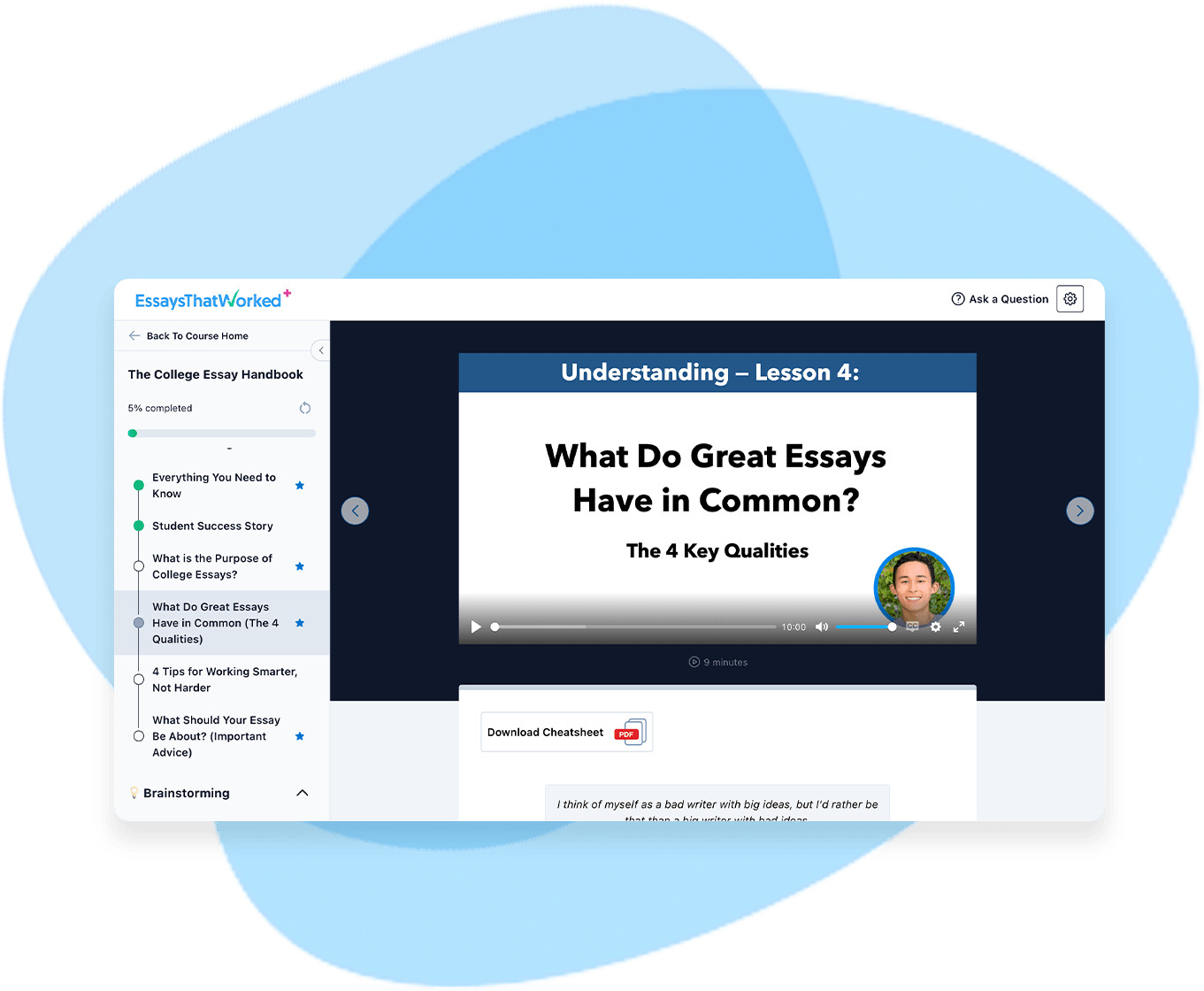
Step-by-step guide to writing outstanding essays. Learn all my secrets, tips and tricks, and mistakes to avoid.
"I believe this: for students without a hook, there's no better hook than having outstanding essays. ”

What is Essays That Worked ?
Essays That Worked is a community of students and parents to share their successful college application essays, inspire others, and learn how to write your own outstanding college essays.
With over 300+ essay examples from real students who got into the Ivy League, Stanford, MIT, UCLA, and more, you'll learn what it takes to write essays that stand out and get you admitted.
Make Every College Essay Your Opportunity to Stand Out
No matter where you are in your college application journey, our goal is simple: to help you write essays you're proud of, so that you can maximize your college opportunities.

What do outstanding essays have in common? Here are our 23 most effective strategies based on lessons from admitted students.
No spam. Unsubscribe anytime.
By signing up you agree to Terms and Privacy Policy
Learn to write outstanding college essays for top schools
Live online workshops where you learn how to go from "What do I write about?" to application essays that stand out.
- Live sessions + Q&A
- Step-by-step lessons
- Worksheets & downloadable guides
- Tips & tricks to improve your writing
- Lessons from 230+ essay examples

Real Essays. Real Acceptances.
Discover over 230 real college essays that worked for over 40 top colleges, written by real students who were accepted to the most selective schools.
Ivy League Essays That Worked
See how real students got accepted into Ivy League schools. Write outstanding admissions essays for top Ivy League schools like...

6 Brown Essays That Worked + Why Brown Examples

5 Columbia University Supplemental Example Essays (2024)

5 Princeton Supplemental Essays That Worked

7 University of Pennsylvania Essays That Worked

6 Dartmouth College Essays That Worked

4 Cornell University Essays That Worked

“ I feel so much more reassured to press the submit button now. I wish I knew about your site sooner! ” Judy Z. Student , University of Pennsylvania
Private Colleges Essays That Worked
Read amazing essay examples for top private universities like Stanford, Johns Hopkins, Northwestern, and more.

4 Carnegie Mellon Supplemental Essay Examples (2024)

6 Duke Supplemental Essays That Worked for 2024

6 Outstanding Johns Hopkins Essays That Worked for 2024

5 How to Write Outstanding MIT Supplemental Essays (With Real Examples)

6 Northwestern Essay Examples & Why Northwestern (2024)

12 Best Stanford Supplemental Essays That Worked 2024

4 University of Southern California (USC) EssaysThatWorked

9 Tufts University Essays That Worked

8 Notre Dame Essays That Worked

7 Emory University Essays That Worked

6 Rice University Essays That Worked

4 Tulane University Essays That Worked

3 Georgetown University Essays That Worked

“ ... Invaluable to me during the college admissions process! It gave me a different perspective to look at my essays. ” Anna M. Student , Duke University
Public Colleges Essays That Worked
Read our best essay examples for public universities like the University of California, University of Michigan, and more. Public colleges receive the most applicants out of all types of schools, so your application essays are increasingly important each year.

18 UC Berkeley Essay Examples that Worked (2024)

18 UCLA Essays That Worked (and Why) for 2024

12 UNC Chapel Hill Essay Examples (2024)

26 University of Michigan Supplemental Essay Examples (2024)

18 UC Santa Barbara Essays That Worked

18 UC San Diego Essays That Worked

7 University of Virginia Essays That Worked

3 University of Wisconsin-Madison Essays That Worked

3 University of Pittsburgh Essays That Worked

“ Thank you for your help with my essays back in November, including my Yale supplements. Just wanted to let you know I ended up getting into and committing to Yale! ” Hannah M. Student , Yale University
© 2018- 2024 Essays That Worked . All rights reserved.
Registration on or use of this site constitutes acceptance of our Terms and Conditions , Privacy Policy , and Cookie Policy .
We have no affiliation with any university or colleges on this site. All product names, logos, and brands are the property of their respective owners.

Choose Your Test
Sat / act prep online guides and tips, 4 tips for writing a johns hopkins essay that works.
College Essays

Johns Hopkins University is considered one of the top-10 national schools in the United States. As the country's first research university, Johns Hopkins is interested in fostering lifelong learning and research. Although their medical school is perhaps their most famous department, Johns Hopkins has many prestigious programs—and their reputation means that admittance is extremely competitive, with just a 8% acceptance rate .
If you want to join the band of Blue Jays, you'll need to be a stellar student—and you'll need to write a killer Johns Hopkins essay. This guide will walk you through the Johns Hopkins supplement, including best practices for answering the prompt, how to plan your essay, and analyzing essays that got other applicants in.
Feature Image: Matthew Petroff /Wikimedia Commons
What Should You Know About the Johns Hopkins Supplement?
The Johns Hopkins application process is fairly straightforward. You can apply using the Coalition Application or Common Application , which each have their own essay questions to answer.
In addition to whatever essay you choose for your application, Johns Hopkins asks for an additional required essay of up to 400 words. There is just a single prompt, so no struggling to pick which one will best suit your needs here!

What Is the Johns Hopkins Essay Prompt?
Johns Hopkins has just one essay prompt. The 2022-2023 prompt focuses on collaboration and teamwork, asking you to think about your own role in working with others:
Founded in the spirit of exploration and discovery, Johns Hopkins University encourages students to share their perspectives, develop their interests, and pursue new experiences. Use this space to share something you'd like the admissions committee to know about you (your interests, your background, your identity, or your community), and how it has shaped what you want to get out of your college experience at Hopkins. (300-400 words)
This prompt is a bit less structured than Johns Hopkins essays in the past, which can present new challenges to students. It can be hard to figure out what exactly Johns Hopkins wants you to write about with a prompt like this one! But don't worry: we're going to break it down for you.
What This Prompt Is Asking You to Do
First things first: let's take a closer look at the first sentence of the prompt. In this sentence, Johns Hopkins is outlining exactly what kind of student they want to admit. Admissions counselors are looking for students with diverse ideas and experiences who are curious and passionate. They also want to admit students who aren't stuck in their ways: Johns Hopkins wants their students to be brave enough to try new things, pursue new ideas, and push themselves academically and otherwise.
To that end, this prompt is asking you to share one thing about yourself and how it has impacted both you and your future goals at Johns Hopkins.
How to Answer the Prompt
To answer this prompt well , you need to zero in on an aspect of your personality that a) isn't addressed in your other application materials, and b) fits with Johns Hopkins' mission and academic culture. Our secret trick to choosing the right trait to talk about? Make a list.
Sit down with a pen and paper and write down unique and interesting things about you. While it's good to focus on the categories in the prompt (identity, background, etc.), don't be afraid to branch out if it makes sense. For instance, maybe you have an incredibly interesting hobby or skill you want to share. Even though those things aren't explicitly listed in the prompt, it's okay to list those things down, too.
Once you've built your list, go through and start culling down until you have a topic that works. Here's what you should ask yourself as you start crossing off ideas:
- Do I talk about this in my application already?
- Is this a common topic that other applicants will write about (like being in band or enjoying the outdoors)?
- Is this aspect of your personality too broad or vague?
- Can you tell a story about this part of yourself?
Once you've picked the aspect of your personality that you want to write about, you need to tell a story around it . Don't just say you've hiked the Appalachian trail. Tell a story about your hike. What was it like? What did you experience? Why did you do it in the first place?
And of course, you also have to explain how this aspect of your personality will impact your education at Johns Hopkins. Maybe you decided to hike the Appalachian Trail because you enjoy testing your endurance, and you want to bring that same tenacity to your studies at Hopkins. Make sure you're tying everything back to your education!

There's no wrong way to celebrate a successful essay.
2 Johns Hopkins Essays That Worked
Even with a guide, it can be hard to figure out exactly what Johns Hopkins is looking for in their essays. Thankfully, the college posts successful essays on their website —complete with admissions office comments—giving you the chance to look through Johns Hopkins essays that worked.
These examples are responses to past prompts, so they do some things quite differently. But reading through them can still give you valuable insight into what Johns Hopkins University values in an essay, such as a cohesive look at each applicant and a creative frame for the topic.
#1: "Time to Spin the Wheel"
Add the fact that I was raised in a Bengali household and studied Spanish in high school for four years, and I was able to add other exotic words. Sinfin, zanahoria, katukutu, and churanto soon took their rightful places alongside my English favorites.
And yet, during this time of vocabulary enrichment, I never thought that Honors English and Biology had much in common. Imagine my surprise one night as a freshman as I was nonchalantly flipping through a science textbook. I came upon fascinating new terms: adiabatic, axiom, cotyledon, phalanges … and I couldn't help but wonder why these non-literary, seemingly random words were drawing me in. These words had sharp syllables, were challenging to enunciate, and didn't possess any particularly abstract meaning.
I was flummoxed, but curious … I kept reading.
… and then it hit me. For all my interest in STEM classes, I never fully embraced the beauty of technical language, that words have the power to simultaneously communicate infinite ideas and sensations AND intricate relationships and complex processes.
Perhaps that's why my love of words has led me to a calling in science, an opportunity to better understand the parts that allow the world to function. At day's end, it's language that is perhaps the most important tool in scientific education, enabling us all to communicate new findings in a comprehensible manner, whether it be focused on minute atoms or vast galaxies.
Romila's interest in language is introduced at the very beginning, but the essay takes a surprising turn midway Because she focuses on language, we'd expect that she's interested in pursuing a literature or writing degree; instead, her interest in language helped shape her love for biology.
What works particularly well in this essay is that it demonstrates Romila's unique background as a language-loving biology major of Bengali heritage. She doesn't need to declare her diversity; it's demonstrated through each unique facet of her personality she brings up.
As the admissions committee comments below the essay, Romila also does a wonderful job of showing her interest in interdisciplinary learning . It's not just that she loves linguistics and biology, but that she sees a clear line from one to the other—she loves both of them and the ways that they flow together.
It's unlikely that you have the same experience as Romila, but keep these things in mind when writing your own essay. How can you use your essay to discuss your educational aspirations? Does the work you've done with others fall into interdisciplinary learning? That can be as unconventional as an edible presentation on nuclear physics or as simple as understanding that your soccer team was made up of people with different skills and positions and how, together, you won the championship.
#2: "And on That Note"
While practicing a concert D-flat scale, I messed up a fingering for a low B-flat, and my instrument produced a strange noise with two notes. My band teacher got very excited and exclaimed, "Hey, you just played a polyphonic note!" I like it when accidents lead to discovering new ideas.
I like this polyphonic sound because it reminds me of myself: many things at once. ... Even though my last name gives them a hint, the Asian students at our school don't believe that I'm half Japanese. Meanwhile the non-Asians are surprised that I'm also part Welsh. I feel comfortable being unique or thinking differently. As a Student Ambassador this enables me to help freshman [sic] and others who are new to our school feel welcome and accepted. I help the new students know that it's okay to be themselves.
There is added value in mixing things together. I realized this when my brother and I won an international Kavli Science Foundation contest where we explained the math behind the Pixar movie "Up." Using stop motion animation we explored the plausibility and science behind lifting a house with helium balloons. I like offering a new view and expanding the way people see things. In many of my videos I combine art with education. I want to continue making films that not only entertain, but also make you think.
Like Romila, Curtis' essay uses an introductory framing device—his experience with playing a polyphonic note—to transition into a discussion of all the ways he is multiple things at once.
Demonstrating his multiple interests is part of why Curtis' essay succeeds so well, but most of these examples aren't just examples of contradictions or subverted expectations. They show other things, too, such as the way other people see him (Asian students don't believe he's half Japanese, non-Asian kids only see him as Asian), how his interest in different fields leads him to create unique projects, and how his experience being different allows him to be welcoming to others.
Curtis' writing is lively without getting lost in the metaphor. The framing device is clear, but it doesn't come up so much that it feels too focused on the idea of a polyphonic note. The essay would work just fine without the metaphor, which means his points are strong and sound.
According to the admissions officers' notes, Curtis' essay stood out in part because of the way it shows his ability to think across disciplines. Creative thinking is a huge asset at a research university such as Johns Hopkins. Like Romila's essay, this interest in interdisciplinary learning proves that he'll be a good fit for Johns Hopkins.

4 Key Tips for Writing Your Johns Hopkins Essay
Because the Johns Hopkins supplement has just one prompt, you'll want to do your absolute best on it. That means getting started early and giving yourself plenty of time to polish and refine your work.
As with all college essays, you should go through multiple drafts and seek feedback from others to make sure your essay is as strong as it can be. The earlier you start, the more time you'll have to whip it into shape!
#1: Brainstorm
Remember all those exercises your high school teachers had you work on, such as mind mapping and free writing? Now's the time to bust them out.
Look at the prompt and write down as many short answers as you can think of, no matter how silly they might sound—you don't have to use them if you don't feel strongly about them! If you spend some time writing down all your ideas, you can choose the one that speaks most strongly to you rather than getting midway through an essay before realizing that it's not what you really want to write about.
#2: Be Specific
Specificity is extremely important. With just 400 words, you need to make sure you're using your space wisely.
Tie your idea directly to Johns Hopkins University rather than speaking in generalities. Look through their course catalog and club offerings, and try to connect some of them to your goals and aspirations. Because the prompt asks about collaboration, try to envision yourself in those spaces, accomplishing your goals thanks to your classmates' support.
#3: Get Feedback
Once you've gone through a draft or two, it's time to turn your precious essay over to someone else for feedback. Find people you trust to give you honest and helpful critique. If they're too harsh, you're not going to want to use their advice. But if they focus too much on praise, you might not end up with anything to change.
Look to teachers or other people who have experience with writing—preferably not parents, as they're a little too close to you to be objective—for good advice.
Let all that feedback sit for a while before you sit down to revise your Johns Hopkins essay. Often, our initial response to feedback is to either implement or reject all of it, neither of which is necessarily the best way to improve an essay.
Consider the feedback you receive and find a middle ground between the recommendations and your voice and goals. It's OK if you don't agree with some of it, but do be sure that you always ask yourself why someone might not have understood your meaning. If clarity is an issue, you can still address that even if you don't agree with someone's suggestion.
What's Next?
A good essay is just one part of a successful Johns Hopkins application. Take some time to make sure your GPA , ACT , and SAT scores are up to par, too!
Need some additional help in writing a great college essay? This guide has all the tips and tricks for turning your ideas into essays !
The college application process can be long and confusing, especially when you're applying to a competitive school like Johns Hopkins. This expert guide to college applications will give you all the tips and information you need to create a truly spectacular application!

Melissa Brinks graduated from the University of Washington in 2014 with a Bachelor's in English with a creative writing emphasis. She has spent several years tutoring K-12 students in many subjects, including in SAT prep, to help them prepare for their college education.
Ask a Question Below
Have any questions about this article or other topics? Ask below and we'll reply!
Improve With Our Famous Guides
- For All Students
The 5 Strategies You Must Be Using to Improve 160+ SAT Points
How to Get a Perfect 1600, by a Perfect Scorer
Series: How to Get 800 on Each SAT Section:
Score 800 on SAT Math
Score 800 on SAT Reading
Score 800 on SAT Writing
Series: How to Get to 600 on Each SAT Section:
Score 600 on SAT Math
Score 600 on SAT Reading
Score 600 on SAT Writing
Free Complete Official SAT Practice Tests
What SAT Target Score Should You Be Aiming For?
15 Strategies to Improve Your SAT Essay
The 5 Strategies You Must Be Using to Improve 4+ ACT Points
How to Get a Perfect 36 ACT, by a Perfect Scorer
Series: How to Get 36 on Each ACT Section:
36 on ACT English
36 on ACT Math
36 on ACT Reading
36 on ACT Science
Series: How to Get to 24 on Each ACT Section:
24 on ACT English
24 on ACT Math
24 on ACT Reading
24 on ACT Science
What ACT target score should you be aiming for?
ACT Vocabulary You Must Know
ACT Writing: 15 Tips to Raise Your Essay Score
How to Get Into Harvard and the Ivy League
How to Get a Perfect 4.0 GPA
How to Write an Amazing College Essay
What Exactly Are Colleges Looking For?
Is the ACT easier than the SAT? A Comprehensive Guide
Should you retake your SAT or ACT?
When should you take the SAT or ACT?
Stay Informed
Get the latest articles and test prep tips!
Looking for Graduate School Test Prep?
Check out our top-rated graduate blogs here:
GRE Online Prep Blog
GMAT Online Prep Blog
TOEFL Online Prep Blog
Holly R. "I am absolutely overjoyed and cannot thank you enough for helping me!”
What are your chances of acceptance?
Calculate for all schools, your chance of acceptance.
Your chancing factors
Extracurriculars.
2 Successful Johns Hopkins Essay Examples
Johns Hopkins University is a private research university in Baltimore, Maryland. Known for its strong foundation in research, the world-renowned teaching hospital (Johns Hopkins Hospital) and Undergraduate Research Awards Program provide opportunities for students to get hands-on experience during their time at Hopkins.
Since Johns Hopkins is a highly selective institution, you’ll need a strong essay to better your chances of acceptance. Let’s take a look at the prompt, and how one student answered it. After, we’ll break down what’s working well, and potential areas for improvement.
Please note: Looking at examples of real essays students have submitted to colleges can be very beneficial to get inspiration for your essays. You should never copy or plagiarize from these examples when writing your own essays. Colleges can tell when an essay isn’t genuine and will not view students favorably if they plagiarized.
Read our Johns Hopkins essay breakdown to get a comprehensive overview of this year’s supplemental prompts.
Essay Example #1
Prompt: Founded in the spirit of exploration and discovery, Johns Hopkins University encourages students to share their perspectives, develop their interests, and pursue new experiences. Use this space to share something you’d like the admissions committee to know about you (your interests, your background, your identity, or your community), and how it has shaped what you want to get out of your college experience at Hopkins. (300-400 words)
My fingers drummed across the table at a rhythmic pace. The musical beat played the chords of my growing anxiety. I ignored the triumphant cheers from the other groups as I held my breath waiting for our results.
My shoulders fell as a wave of defeat accompanied the empty screen. The only thing that arose was the doubtful thoughts belting in my head.
“I’m wasting so much time.” “Do I not have what it takes to be a scientist?”
The contrast of my dark skin and bright lab coat was noticeable in the laboratory. Yet, the white coat stayed on as I continued jotting my observations in my lab notebook. An array of different colored beakers decorated my workstation along with many pipets. For the duration of my eight-week internship, my partner and I had to extract DNA with PCR primers and show its dilution through gel electrophoresis. If done correctly, the DNA bands will appear on the imaging scanner. In other words, we had to grow resilience.
Along with our increasing failed attempts, our resilience began to blossom. Despite setbacks, our endeavor’s brought us closer to the scientists we worked with. “Success doesn’t come easy, if it did then it wouldn’t feel successful” one of our directors lectured. With those words, an inferno ignited as I put on my lab coat once again, eager to continue my attempts. By the seventh week, we were back in the imaging room awaiting our results. I held a pencil in one hand and my notebook in the other keen to note any areas of improvement. Surprisingly, the screen presented our DNA with zero contaminants. My heart skipped a beat as my face grew sore from my grin, eyes glued to the rows of perfect DNA bands– I felt successful.
This kind of prosperity attracts me about Hopkins,– a victory that is met with consistent labor. Being America’s first research university shows the resilience and dedication it takes to make the world a better place. I would like to be a part of this trajectory by working with Dr. Bastian and her fascinating investigation in advancing our understanding of the genetics of inherited neurological and psychiatric diseases. At Hopkins, I can continue experiencing success along with a community of like-minded people.
What the Essay Did Well
This essay does a fabulous job of conveying this student’s feelings through descriptive imagery. We understand their initial anxiety when they say “ My fingers drummed across the table at a rhythmic pace ” and “ I held my breath waiting for our results. ” Then, when they provide their internal dialogue second-guessing themselves, we understand their anxiety stems from self-doubt and a lack of confidence. We’ve barely begun the essay, and we have already learned so much about this student.
The student uses their lab coat as a symbol throughout the essay, bringing an extra layer of depth, nuance, and maturity. While it originally makes them feel out of place, “ The contrast of my dark skin and bright lab coat was noticeable in the laboratory, ” as they grow more comfortable and resilient, they welcome it with pride: “ With those words, an inferno ignited as I put on my lab coat once again, eager to continue my attempts. ” Using an object as a proxy for their feelings is a beautiful way to convey their growth and demonstrate their talent for story-telling.
Because this essay tells a story of how a student overcame a personal obstacle, we see so much of their character shine through. This student didn’t just limit themselves to discussing their interests, but really hit the nail on the head when it came to showing how it has shaped them, by framing their response in the manner of an “ Overcoming Challenges ” essay. This is a good example of not boxing yourself into one essay archetype just because that’s what the prompt asks for. Make sure you address the prompt in full, but don’t be afraid to elevate your essay with elements of other essay archetypes.
What Could Be Improved
Although this essay does a very nice job sharing who this student is, it could have used more elaboration on who they hope to be at Hopkins. Not addressing the school until the final paragraph makes it seem like an afterthought. As much as admissions officers want to know who you are, they also want to know how you will fit into the campus community. Therefore, it is a better idea to integrate resources and opportunities the school offers throughout your essay, rather than saving it for the end.
They could have compared the professor they want to work with to their inspiring director who taught them about success and mused over what life-changing tidbits Dr. Bastian will share. They could have mentioned a class that covers the nuances of DNA imaging that they hope to take to understand what their perfect bands of DNA mean. Maybe there is a club on campus for scientists of color that they want to join to collaborate with people to fully conquer their self-doubt.
There are many different opportunities that this student could have weaved through their essay to truly demonstrate how they would fit seamlessly into Hopkins, without sacrificing the descriptive narrative they have crafted about themselves.
Essay Example #2
As I stretch the rubber band to touch the edge of the cardboard strip, the fingers curl. I release the elastic, watching as the joints, made of popsicle sticks, relax successively. Finally, my project is ready. In the Biomedical Engineering section of the GAMES camp at the University of Illinois, we were asked to construct a prosthetic arm that could grip and move a block of clay. After hours of meticulous redesigning, I crafted a successful prototype and became obsessed with using engineering to tackle challenges in medicine.
The following summer, I explored bioengineering on a cellular level at the Stanford Pre-Collegiate Summer Institutes, where a project on limb regeneration sparked my interest in biomedical research. I eventually pursued hands-on research experience with the USC Biomechanics Research Lab. In my project, I apply scientific principles to running to prevent stress-induced injuries in athletes. By analyzing video frames of PAC-12 athletes in motion and linking them to force plate data, I create videos and graphs for analysis. Comparing this data to athletes after a stress fracture, I observe differences that increase susceptibility to injury, ultimately improving the health of athletes using engineering.
From these experiences, I grew interested in majoring in Biomedical Engineering at Hopkins, where I find a distinct focus on hands-on learning. I am particularly excited to participate in design projects in the course “Rehabilitation Engineering Design Lab”. The uncommon structure of this course will allow me to design a medical device to fit the needs of patients with disabilities, which will then be analyzed in rehabilitation centers. Through this real-world approach to learning, I will strengthen my teamwork skills and address modern medical issues, furthering my interest in Biomedical Engineering through first-hand exploration.
As a top-tier research institution, Hopkins will also provide me with ample opportunities to explore my curiosities and build on my research experience from the USCBRL. In the Alzheimer’s Disease Research Center, I hope to work under Dr. Marilyn Albert in discovering new treatments for dementia. I became interested in neurological research when my grandmother was diagnosed with Alzheimer’s disease. As I watched her diagnosis progress, I became curious about the underlying biological mechanisms behind her decline and wondered how biomedical research could prevent neurodegenerative disease. In this lab, I will tie my personal interest in neurological research to my passion for improving medicine through engineering, making Hopkins the ideal place to explore my interests.
This essay starts off with a strong hook: “As I stretch the rubber band to touch the edge of the cardboard strip, my fingers curl.” This is intriguing, as the reader is urged to continue following the action of the scene and piece together what this student is passionate about.
The student uses personal examples, like their experience at the Stanford Pre-Collegiate Institute and their grandmother’s Alzheimers, to make their passion for their intended area of study clear. It’s important to do this, to create a purposeful essay that speaks to who you are and why you are choosing a specific area of study, career path, and university.
The student moves back and forth seamlessly between their own personal life, and their plans for studying at the university. The writer always connects their life to their collegiate identity : for example, in the third paragraph it says “From these experiences, I grew interested in majoring in Biomedical Engineering at Hopkins, where I find a distinct focus on hands-on learning.” This narrative structure results in an engaging essay.
A major weakness of this essay is how broad it is. With a more general prompt like this that asks you to “share something you’d like the admissions committee to know about you,” students often make the mistake of trying to convey their whole life story, and this student fell into that trap a bit.
Rather than telling us about the GAMES camp, the Stanford Institute, and their grandmother’s diagnosis, this student could have tightened up the essay by choosing one of their deepest fascinations and delving into how they will explore that particular interest at Hopkins.
They could include one strong, detailed anecdote, rather than squeezing in two or three that aren’t flushed out. There would be a central idea running through the essay that makes it very easy for the reader to appreciate what this student cares about, why they care, and how they plan to act on their interest in college.
It’s okay to not address multiple facets of your personality and interest in an essay—in fact, it’s usually preferred! Admissions officers will still understand the complexity of your personality from other parts of your application, but your essay will provide them with much more insight if it is focused and detailed, not a broad summary.
Where to Get Your Johns Hopkins Essays Edited
Do you want feedback on your Johns Hopkins essays? After rereading your essays countless times, it can be difficult to evaluate your writing objectively. That’s why we created our free Peer Essay Review tool , where you can get a free review of your essay from another student. You can also improve your own writing skills by reviewing other students’ essays.
If you want a college admissions expert to review your essay, advisors on CollegeVine have helped students refine their writing and submit successful applications to top schools. Find the right advisor for you to improve your chances of getting into your dream school!
Related CollegeVine Blog Posts

Are you seeking one-on-one college counseling and/or essay support? Limited spots are now available. Click here to learn more.
Johns Hopkins Supplemental Essays (2023-24) Prompts and Advice
September 3, 2023

In the most recent admissions cycle, Johns Hopkins University admitted approximately 6% of applicants into the Class of 2027. As a school that rejects thousands of applicants each year with 1500+ SATs and impeccable transcripts, those hoping for a positive result at JHU need to find additional ways to shine in the eyes of the admissions committee. The Johns Hopkins supplemental essay is one such opportunity.
(Want to learn more about How to Get Into Johns Hopkins University? Visit our blog entitled: How to Get Into Johns Hopkins for all of the most recent admissions data as well as tips for gaining acceptance.)
Given that 19 of every 20 RD applicants to Johns Hopkins University are ultimately unsuccessful, you need to do everything you can to stand out amidst a sea of uber-qualified teens from around the globe. Through its one mandatory essay prompt, Johns Hopkins University’s supplemental section still affords applicants an opportunity to highlight what makes them uniquely qualified for admission. Below is Johns Hopkins’s supplemental prompt for the 2023-24 admissions cycle. Additionally, you’ll find our tips on how to write a winning composition.
Johns Hopkins Supplemental Essay Prompt
Tell us about an aspect of your identity (e.g. race, gender, sexuality, religion, community, etc.) or a life experience that has shaped you as an individual and how that influenced what you’d like to pursue in college at Hopkins. (This can be a future goal or experience that is either academic, extracurricular, or social). (300 word limit)
JHU is inviting you to share more about your background/identity/community through the lens of how that will impact your experience at the university. Take note of the wide-open nature of this prompt. You are essentially invited to talk about any of the following topics:
- A perspective you hold
- An experience/challenge you had
- A community you belong to
- Your cultural background
- Your religious background
- Your family background
- Your sexual orientation or gender identity
Johns Hopkins Supplemental Essays (Continued)
Although this prompt’s open floor plan may feel daunting, a good tactic is to first consider what has already been communicated within your Common App personal statement and activities list. What important aspect(s) of yourself have not been shared (or sufficiently discussed)? The admissions officer reading your essay is hoping to connect with you through your written words, so—within your essay’s reflection—be open, humble, thoughtful, inquisitive, emotionally honest, mature, and/or insightful about what you learned and how you grew.
You’ll then need to discuss how your background/identity/experiences have influenced your academic, social, or extracurricular college goals. As such, think about what you learned and how it relates to one of the previously mentioned areas. For example, perhaps growing up in Northern California has made you passionate about post-wildfire ecosystem restoration, which you hope to pursue further through Johns Hopkins’ environmental science program. Or, perhaps your experience as a tutor has made you interested in The Tutorial Project , or the discrimination you watched your sibling face after revealing their gender identity has informed your desire to be part of initiatives like the Safe Zone Program .
To that end, be sure you address how you will take advantage of Johns Hopkins’s immense resources. The includes both inside and/or outside of the classroom. You can accomplish this by citing specific academic programs , professors , research opportunities , internship/externship programs , study abroad programs , student-run organizations , etc.
How important are the Johns Hopkins supplemental essays?
Johns Hopkins University considers six factors “very important” in evaluating a candidate. The essays are among them. In addition to the essays, Johns Hopkins gives the greatest consideration to the rigor of one’s school record, GPA, standardized test scores, recommendations, and character/personal qualities.
Want personalized assistance?
Are you interested in working with one of College Transitions’ experienced essay coaches as you craft your Johns Hopkins essays? We encourage you to get a quote today.
- College Essay

Dave Bergman
Dave has over a decade of professional experience that includes work as a teacher, high school administrator, college professor, and independent educational consultant. He is a co-author of the books The Enlightened College Applicant (Rowman & Littlefield, 2016) and Colleges Worth Your Money (Rowman & Littlefield, 2020).
- 2-Year Colleges
- Application Strategies
- Best Colleges by Major
- Best Colleges by State
- Big Picture
- Career & Personality Assessment
- College Search/Knowledge
- College Success
- Costs & Financial Aid
- Data Visualizations
- Dental School Admissions
- Extracurricular Activities
- Graduate School Admissions
- High School Success
- High Schools
- Homeschool Resources
- Law School Admissions
- Medical School Admissions
- Navigating the Admissions Process
- Online Learning
- Outdoor Adventure
- Private High School Spotlight
- Research Programs
- Summer Program Spotlight
- Summer Programs
- Teacher Tools
- Test Prep Provider Spotlight

“Innovative and invaluable…use this book as your college lifeline.”
— Lynn O'Shaughnessy
Nationally Recognized College Expert
College Planning in Your Inbox
Join our information-packed monthly newsletter.
I am a... Student Student Parent Counselor Educator Other First Name Last Name Email Address Zip Code Area of Interest Business Computer Science Engineering Fine/Performing Arts Humanities Mathematics STEM Pre-Med Psychology Social Studies/Sciences Submit
Johns Hopkins University Supplemental Essays 2022-2023
Johns hopkins supplemental essays 2022 – 2023.
In this guide, we’ll walk you through how to approach each of the Johns Hopkins essays. But before diving into how to write the Johns Hopkins supplemental essays, let’s learn a little about this prestigious university’s history and popularity.
Founded in 1876, Johns Hopkins University is a private research university located in Baltimore, Maryland. Widely considered the first research university in the United States, Johns Hopkins’ popular majors include public health, biomedical engineering, molecular biology, international relations and affairs, and economics. JHU consistently ranks as one of the best universities to study science, specifically biology and public health .
This Johns Hopkins essay guide will teach you how to maximize your Johns Hopkins University essays and increase your chances of admission.
Johns Hopkins Essay: Quick Facts
- Johns Hopkins University acceptance rate: 8%— U.S. News ranks Johns Hopkins as a most selective school.
- 1 essay (300-400 words)
- Johns Hopkins application note: Students must submit their applications via the Common App or Apply Coalition on Scoir . Johns Hopkins admissions look at three important aspects when evaluating applicants: academic character, impact and initiative, and personal contributions.
- Johns Hopkins supplemental essays #1 tip: Applicants who overcome the competitive Johns Hopkins acceptance rate will use their Johns Hopkins supplemental essays to show the admissions committee who they are and how they’ll enrich the Johns Hopkins community. So, try to be creative in your Johns Hopkins supplemental essays.
Does Johns Hopkins require supplemental essays?
Yes—in addition to the main essay prompts on the Common App or Coalition App , you must complete one Johns Hopkins essay . The Johns Hopkins supplemental essay is a key part of your application. For a complete list of application requirements and access to the Johns Hopkins supplemental essays, visit the Johns Hopkins admissions website .
The Johns Hopkins supplemental essays and the Common/Coalition App essay are extremely important, especially given the low Johns Hopkins acceptance rate. Need help navigating your Common App application? CollegeAdvisor.com’s Common App essay breakdown can demystify the process.
JHU is a popular and competitive university. Over 30,000 students applied to be a part of the 2025 class. The school boasts famous alumni like novelist Chimamanda Ngozi Adichie, former New York City mayor Michael Bloomberg, and film director Wes Craven. So, if you get into Johns Hopkins with a strong Johns Hopkins essay, you’ll be in good company.
Your Johns Hopkins supplemental essays can be a great opportunity to introduce yourself to admissions officers, fill in gaps in your application, and make a case for why you deserve an acceptance letter from Johns Hopkins. So, you should do all you can to highlight your strengths in your Johns Hopkins essay. In this guide, we’ll help you craft engaging Johns Hopkins supplemental essays and maximize your admissions odds.
What are the Johns Hopkins essay prompts?
Students will be required to to submit one Common App or Coalition App essay of their choice from the prompts listed on each site. Additionally, all applicants will respond to the same Johns Hopkins application essay prompt.
The following is the prompt for applicants’ Johns Hopkins supplemental essays:
Founded on a spirit of exploration and discovery, Johns Hopkins University encourages students to share their perspectives, develop their interests and pursue new experiences. Use this space to share something you’d like the admissions committee to know about you (your interests, your background, your identity or your community) and how it has shaped what you want to get out of your college experience at Hopkins. (300-400 words)
Like many essay prompts, the Johns Hopkins supplemental essay prompt focuses on the idea of community. Your Johns Hopkins essay should not only highlight who you are as a person, but also what you would bring to campus life. So, successful Johns Hopkins supplemental essays will need to answer both of these questions.
Johns Hopkins Essay Prompt: Preparing your response
Applicants only need to write one Johns Hopkins essay, which has a limit of 300-400 words. Since this is the only Johns Hopkins essay prompt, you’ll want to give the Johns Hopkins essay the attention it deserves.
The Johns Hopkins essay prompt aims to learn more about how students envision themselves contributing to the Johns Hopkins community. When writing your Johns Hopkins supplemental essays, keep in mind the ideas of identity and community. These ideas are extremely open-ended, which gives you lots of flexibility in your Johns Hopkins essay. This also gives applicants the opportunity to get creative with their Johns Hopkins supplemental essays.
While that may be overwhelming, remember that it isn’t necessarily what you choose to write about that matters most; it’s how you do so. So, think carefully about how you structure your Johns Hopkins essay. This starts by choosing the right Johns Hopkins essay topic.
Zoom in on your passions
As you write your Johns Hopkins supplemental essays, focus on your passions. This is one of the most important factors for successful Johns Hopkins University essays. Remember that you will brainstorm, draft, edit, and rewrite your Johns Hopkins supplemental essays many times. So, you’ll want to choose a Johns Hopkins essay topic that you won’t get tired of looking at.
It’s also okay if writing college essays doesn’t come naturally to you. Give yourself ample time prior to the Johns Hopkins application deadline to choose a topic and understand how to write a college essay . Then, you can dig into writing your Johns Hopkins essay.
How do I write the Johns Hopkins essay?
We mentioned before that the Johns Hopkins essay prompt is similar to many other universities’ supplemental essays. Like other prompts, the Johns Hopkins essay prompt gives students the opportunity to share more about their interests , backgrounds, identities, or community. Essentially, Johns Hopkins supplemental essay prompt asks how your experiences have impacted you. It also asks what you want from your Johns Hopkins experience.
Before we get into how to write successful Johns Hopkins supplemental essays, applicants may want to look to other similar prompts from other universities for inspiration on how to get started. Check out our essay guides from Rice University and Caltech , which both have similar prompts.
Research institution
As you approach the Johns Hopkins supplemental essays, remember that Johns Hopkins University is a research institution. Like any university, they want to build a diverse academic community of intellectually curious individuals— inside and outside of the classroom.
This Johns Hopkins essay invites you to share what makes you, you. Then, the Johns Hopkins essay prompt asks how this aspect of your identity will guide your time at Johns Hopkins and beyond. So, strong Johns Hopkins essays will invite the reader into the world of the applicant.
Successful Johns Hopkins University essays will use descriptive, dynamic language. In your Johns Hopkins supplemental essays, focus on setting a scene rather than trying to dazzle readers with SAT vocabulary words. After all, the best Johns Hopkins University essays will be the most authentic.
Ready to craft an impressive Johns Hopkins application essay? Let’s get started.
Organize your thoughts
Begin drafting this Johns Hopkins supplemental essay by thinking about who you are. First, write a list of your key qualities. Then, categorize each item using the criteria in the Johns Hopkins essay prompt: your interests, background, identity, and community.
Distinguish each category—interests, background, identity, and community—as carefully as possible as you start to tackle this Johns Hopkins essay prompt. Begin with your interests. For example, if you devour every article and book you can find on quantum mechanics, that’s an interest you could write about in the Johns Hopkins supplemental essays.
Avoid listing non-intellectual interests like an obsession with learning new TikTok dances. Of course, students who plan to major in dance or sociology may be able to connect these activities to what they hope to experience at Hopkins in order to craft successful Johns Hopkins University essays. However, your Johns Hopkins supplemental essays should showcase you in the best possible light. Think of yourself as a student and community member. Then, use that to guide your Johns Hopkins supplemental essay topic.
Next, shift to your background. Think about where you come from and how these places and experiences have made you who you are. In your Johns Hopkins essay, you’ll want to avoid cliché, overly sentimental aspects of your background. For example, having a parent who attended Johns Hopkins may have shaped why you want to attend. However, this doesn’t tell admissions officers anything interesting about you or what you hope to learn at Johns Hopkins. So, these types of topics won’t lend to crafting impressive Johns Hopkins supplemental essays.
Instead, look for experiences that sparked intellectual curiosity. Are you a softball player that spent a season perfecting your pitch but, in the process, began learning about physics ? That could be a great topic for your Johns Hopkins essay.
After exploring your background, move to identity. When categorizing identity in this Johns Hopkins essay, you may automatically default to the classic definitions: ethnicity, gender, age, religious beliefs, first-generation college student , etc. While there’s nothing wrong with starting here, think outside of the box for this Johns Hopkins essay prompt. Are you a contrarian? An activist? A pessimist? Thinking about the less obvious ways that you self-identify can help you write an interesting Johns Hopkins essay.
Finally, shift to your community. Jot down some of the communities you belong to. Whether it’s a religious community, your neighborhood, or even the building where you live, list the spaces you inhabit.
Again, this Johns Hopkins supplemental essay rewards those who think outside the box. Are you an active member of an online community of gamers? Do you spend time with fellow gardeners sharing tips on how to care for plants? Community manifests in a wide variety of ways. So, as you brainstorm for the Johns Hopkins essay prompt, make sure to cover all important ways you live and work with others.
After jotting down experiences, interests, identities, etc., sit with your list for a day or two. Do any items stick out as a perfect response to this Johns Hopkins essay prompt?
If not, don’t worry. Try our reflection exercises to help you get started. Set a timer and spend 30 minutes or so expanding on a few of your topics. Limit yourself to 10 minutes per topic. Were there any topics that you couldn’t stop writing on? If so, you’ve found the subject for your Johns Hopkins supplemental essay!
Tell the Story
In this Johns Hopkins essay prompt, you only have 300-400 words. Use them wisely to maximize the impact your Johns Hopkins essay can have in admissions.
This word count creates the key challenge of the Johns Hopkins essay: namely, you’ll want to balance a concise structure with descriptive language. Your language should draw the reader into the interest, background, identity, or community your Johns Hopkins essay addresses. At the same time, strong Johns Hopkins supplemental essays will avoid excessive wordiness.
How do I write the Johns Hopkins Essay?- An exercise to get you started
Let’s try an exercise to help you make your Johns Hopkins essay shine. Which of the descriptions below seems more engaging?
Example 1: Since the age of five, I’ve belonged to my local church.
Example 2: There is a pew in the center of my church. If you look closely, you’ll see where I scratched my initials into the wood at age five.
See the difference? Both sentences communicate the same information (church attendance from a very young age). However, the second example provides details that invite the reader into your story. This type of enticing and descriptive writing will often lead to successful Johns Hopkins University essays.
Read over your Johns Hopkins essay carefully. Then, think about how every word serves your essay’s overall narrative. Your Johns Hopkins essay should use as few words to make as significant an impact as possible.
Make Johns Hopkins Connections
This Johns Hopkins supplemental essay isn’t a “Why Johns Hopkins” prompt in the classic sense. However, the Johns Hopkins essay still asks how your identity, background, interests, and community have shaped what you will bring to Hopkins. Johns Hopkins supplemental essays that answer this part of the prompt will be the most impressive.
Maybe you know what you want to major in and can draw a clear connection between your background/identity/community and that intended major. If so, use this Johns Hopkins essay to emphasize that connection. Successful Johns Hopkins supplemental essays will reveal both who an applicant is and why they belong at Johns Hopkins.
Let’s revisit the “gamer community” example.
I have learned so much from organizing coding events in my online gaming forum. My friends from all over the world have shown me that even if we don’t speak the same language, our passion for coding and games is universal. I’m looking forward to taking classes in the JHU video game design lab and building a bridge between my online community and the in-person one I’ll find at JHU.
This example clearly shows us how this student’s gaming interest has prepared them to take full advantage of this JHU-specific program. Successful Johns Hopkins University essays will show, or even hint at, how you would thrive on campus.
If you haven’t chosen your major yet, you can still answer this portion of the Johns Hopkins essay. To do this, you’ll want to make the focus of your Johns Hopkins essay more abstract. For example, let’s say you choose to write about your community, specifically the apartment building you live in.
The hot Houston sun draws the people from my building by late afternoon. Grannies of every race and culture line the long bench in front of the building and watch the younger children play. The other families in building 3318 are like my extended family. I’m reminded of this when I knock on Mr. Johnson’s door to borrow an extra onion for my mom’s soup or when I’m invited to a birthday party for one of the Gonzalez cousins. Family is where you find it, and location makes all the difference. At Johns Hopkins, I’m hoping to build a community like the one that my family and I have found in building 3318.
This example shows how community can be found in many different ways. Successful Johns Hopkins supplemental essays can creatively show how your lived experiences will enhance your time on campus. They will also highlight how you will enrich the lives of those around you at JHU.
Johns Hopkins Essay Reflection Questions:
When you’ve finished your Johns Hopkins essay prompt draft, ask yourself the following questions:
- Do I clearly identify an interest, part of my background, identity, or community?
- Am I writing about my topic using descriptive, dynamic language that draws the reader in?
- Does my Johns Hopkins essay draft show evidence of how this interest, background, identity, etc. has shaped me?
- Is there a connection between my topic and what I hope to learn/experience at Johns Hopkins?
Johns Hopkins supplemental essays & their admissions process
The best Johns Hopkins supplemental essays will be genuine and vulnerable. Johns Hopkins University essays should also showcase traits that would make you a valuable addition to the Johns Hopkins community.
Strong Johns Hopkins supplemental essays should reveal who you are beyond your scores and transcript. This allows the admissions committee to view you as a person rather than a statistic.
Read successful past essays
Every year, the university publishes several successful Johns Hopkins supplemental essays. Read over these Johns Hopkins University essays that worked to get an idea of what impresses admissions. Notice in these Johns Hopkins supplemental essays that each student has a concrete sense of self.
For example, in the Johns Hopkins essay “Red Over Black” by Elizabeth, she discusses how playing solitaire with her grandmother allowed her to learn the value of hard work and self-motivation. Elizabeth shares how that learning shapes every aspect of her life: academics, athletics, and even family life.
Similarly, the Johns Hopkins application essay “Lifelong Learning” by Rozanne explores how her search for passion has allowed her to have and learn from many new experiences. This Johns Hopkins essay is a great example of how applicants don’t have to have a clear career path or even major when applying. Rozanne shows that while she is still discovering her passions, she will be an active participant in the Johns Hopkins community.
Highlight your creativity
You’ll also notice that many of the successful Johns Hopkins supplemental essays are written creatively. Rozanne and Elizabeth both use descriptive language to make us feel like we are right there crocheting and playing solitaire, respectively.
In fact, all of the Johns Hopkins supplemental essays that worked listed on the site are unique. Successful Johns Hopkins University essays are often creative. So, don’t be afraid to start your essay with an exciting and intriguing description to set the scene.
By including these types of Johns Hopkins supplemental essays, the university encourages you to be creative. So, you can structure your response to the Johns Hopkins essay prompt in any number of interesting ways. Think about how you can highlight your creativity in your Johns Hopkins supplemental essays.
Remember the prompt
Make sure your Johns Hopkins essay structure serves the prompt. While creativity is good, you don’t want your Johns Hopkins supplemental essay to look and read like a gimmick. Above all, tell your story in the way most authentic to you.
You’ll notice one successful essay “Stepping Out of my Comfort Zone” by Samuel was more traditional than the others mentioned. However, it’s still listed as one of the top Johns Hopkins University essays submitted. So, don’t feel pressured to write in a way that isn’t true to you. Use your own writing style and voice to best respond to the Johns Hopkins essay prompt.
Finally, and it should go without saying, these Johns Hopkins supplemental essays are examples . So, don’t think of them as a blueprint of how you must structure your own Johns Hopkins supplemental essays. You also shouldn’t compare the experiences shared in these Johns Hopkins supplemental essays with your own.
Finally, the Johns Hopkins supplemental essays are personal statements. Every person is unique—every Johns Hopkins essay will be, too. Strong Johns Hopkins University essays will be inherently individual, so don’t worry if yours doesn’t look like the examples.
Does the Johns Hopkins essay matter?
Every aspect of the Johns Hopkins application is important, from your mid-year report to the Johns Hopkins essay. When applying to JHU , treat each item on the application as crucial to creating a compelling candidate profile.
It will take far more than just meeting the Johns Hopkins application deadline and requirements in order to secure your spot. Make sure to allow yourself enough time to craft compelling Johns Hopkins supplemental essays that will bolster your college application narrative.
With more selective schools like Johns Hopkins, most candidates have high test scores and GPAs. The Johns Hopkins essay, then, becomes a chance for you to truly stand out from other applicants. Since Johns Hopkins has extended their test-optional policy through to the 2025-2026 application year, essays are now more important than ever when trying to stand out among a large pool of qualified candidates. So, strong Johns Hopkins supplemental essays can make a major difference in admissions.
Additionally, applicants may want to submit other supplemental materials to support their Johns Hopkins application essay and overall application narrative. For example, you may want to add a college application letter or an art portfolio. While JHU accepts supplemental materials, they encourage applicants to only submit extra materials if they will genuinely add to their application.
Other Johns Hopkins Resources from CollegeAdvisor
Ranking as #7 on U.S. News Best National Colleges list, it’s no surprise that the Johns Hopkins acceptance rate is so low. As one of the best colleges in the nation, applicants will want to do all they can in order to stand out. An integral deciding factor in the application process are the Johns Hopkins supplemental essays; however, there are other important factors such as applicants’ GPAs and recommendation letters .
While we’ve outlined how to write successful Johns Hopkins supplemental essays in this guide, it’s also important to understand the whole application process. Remember that the Johns Hopkins admissions committee will look for applicants who show academic excellence and community involvement. So. make sure that you have a well-rounded application. Strong Johns Hopkins supplemental essays will add important value to your application narrative by filling in any gaps or adding information not mentioned elsewhere.
Additionally, if you’re seriously considering how to get into Johns Hopkins, then you should first look at our guide .
How to Get Into Johns Hopkins Guide
Read Johns Hopkins essay examples
As previously mentioned, the Johns Hopkins admissions site shows some examples of Johns Hopkins University essays that worked. These can give you some inspiration as you craft your own Johns Hopkins essay.
We’ve also chosen some of our favorite successful Johns Hopkins supplemental essays. In this guide , we show some examples of strong Johns Hopkins supplemental essays and explain why they work. While you shouldn’t try to mimic any of these examples, understanding important qualities in successful Johns Hopkins supplemental essays will help you to write your best Johns Hopkins essay. You may also want to look at other successful college essay examples in order to get you motivated and inspired to start writing your Johns Hopkins essay.
Johns Hopkins University Essays that Worked
Another resource that hopeful Johns Hopkins applicants should take advantage of is our Johns Hopkins admissions article . While it’s important to write the best Johns Hopkins supplemental essays possible, it’s impossible to do so without truly understanding what the admissions committee looks for. In this article, we break down acceptance rates and look at the average GPA and standardized test scores for recently admitted JHU students. We also explain how to visit JHU in person or virtually.
Find your fit
Finally, remember to focus on your college fit. The more you know that JHU is the place for you, the stronger your Johns Hopkins essay will be. Your essays, grades, and other application requirements are important, but students should remember that you need to make sure the school is a good fit for you . While JHU is a renowned university, you won’t actually know how you feel on campus until you’re there. Try to visit the school before making important college enrollment decisions down the road. And, lucky for you, if that’s not possible, then there are virtual tours that could show you how you may feel on campus.
Finding Your College Fit
Another great way to learn about Johns Hopkins is by speaking with current students or alumni. You’ll be able to hear about their first-hand experiences of applying to and studying at this prestigious institution. Watch this recent webinar where two alums answer some common questions about what it takes to apply to and attend JHU.
Johns Hopkins University Panel
Once you’ve done some research, you’ll be in an even better position as you approach the Johns Hopkins essay.
Research scholarship opportunities
Scholarships are also an important part of the college application process. With the cost of college so high, it only makes sense to apply to all the scholarships possible in order to lower your education costs. Check out our webinar which gives you tips on making your scholarship and college applications stand out.
Johns Hopkins is committed to admitting the “brightest minds” no matter their socioeconomic status. You can use their college cost calculator to get an estimate of your potential tuition costs. Keep in mind that most schools will give students the opportunity to estimate their tuition cost which may be an important factor when choosing colleges. When considering college costs, use all the resources available. This includes our article which outlines how to pay for college .
Johns Hopkins Essay – Final Thoughts
Completing the Johns Hopkins application essay can seem daunting. Try to view this Johns Hopkins supplemental essay as an opportunity to introduce yourself to the admissions team. Use the Johns Hopkins supplemental essays provided on the JHU site and in our “Johns Hopkins Essays That Worked” article for inspiration. Remember that you have plenty of personal experiences to draw from for this Johns Hopkins application essay—you just have to think critically and creatively about them.
Remember that the Johns Hopkins application essay matters—a lot! Maybe you’re applying with fewer extracurricular activities than you would like or perhaps a lower SAT/ACT score than normally accepted. A well-written Johns Hopkins essay can be the difference. Use this guide to help you approach the Johns Hopkins supplemental essay with a solid strategy and a clear timeline. That way, you’ll have plenty of time to perfect your Johns Hopkins essay before the Johns Hopkins application deadline. Good luck—you’ve got this!
This article was written by Sarah Kaminski. Looking for more admissions support? Click here to schedule a free meeting with one of our Admissions Specialists. During your meeting, our team will discuss your profile and help you find targeted ways to increase your admissions odds at top schools. We’ll also answer any questions and discuss how CollegeAdvisor.com can support you in the college application process.
Personalized and effective college advising for high school students.
- Advisor Application
- Popular Colleges
- Privacy Policy and Cookie Notice
- Student Login
- California Privacy Notice
- Terms and Conditions
- Your Privacy Choices
By using the College Advisor site and/or working with College Advisor, you agree to our updated Terms and Conditions and Privacy Policy , including an arbitration clause that covers any disputes relating to our policies and your use of our products and services.
How to Write the Johns Hopkins University Supplemental Essay

Reviewed by:
Former Admissions Committee Member, Columbia University
Reviewed: 5/6/24
Interested in attending Johns Hopkins? Below, we’ll explain how to write a winning supplemental essay to help your application shine!
Johns Hopkins University (JHU) is a top-tier institution known for its high commitment to excellence in research and education. Hopeful students must demonstrate their academic potential, values, and unique characteristics.
Your supplemental essay is an excellent opportunity to tell the admission committee about your experiences, aspirations, and enthusiasm for Johns Hopkins. You can also use them to explain how your values align with the school’s mission and highlight your potential to contribute to the university.
In this article, we will go through the process of crafting a compelling Johns Hopkins supplemental essay and provide valuable insights into approaching your response so you can increase your chances of admission.
Johns Hopkins University Supplemental Essay Prompts 2024
On Common App, students are required to respond to just one supplemental essay prompt for their Johns Hopkins application:
“ Tell us about an aspect of your identity (e.g., race, gender, sexuality, religion, community, etc.) or a life experience that has shaped you and how that influenced what you’d like to pursue in college at Hopkins. This can be a future goal or experience that is either academic, extracurricular, or social. (200-350 words)”
How to Write the Essay Prompt for Johns Hopkins University
Not sure how to respond to this year’s prompt? Don’t worry; we’ve got you covered! This section will give you key tips to help you focus your approach.
How to Write the Johns Hopkins University Supplemental Essay #1 + Analysis and Tips
Analysis of Prompt : The university makes this question open-ended to its applicants so they can write about their culture and identity, which has shaped their values and aspirations. The prompt is a good example of a diversity essay in which the applicant will discuss the link between their identity and goals at JHU. This means the admission committee wants to know how your life experiences will impact what you want to achieve in the institution.
Below are some tips to take note of when writing the JHU supplemental essays:
- Start With Self-Reflection : Reflect on various aspects of your identity or life experiences, and select one that has significantly shaped your perspective or values.
- Highlight Personal Connection : Detail a specific event, realization, or experience that intimately connects this aspect to your identity. Express why this facet holds personal significance, revealing the emotions or values it embodies.
- Link to Future Goals : Clearly connect this aspect of your identity or experience to your future goals, explaining how it has inspired your academic, extracurricular, or social aspirations.
- Do Your Research : Show that you've researched specific programs, opportunities, or values at Johns Hopkins, and demonstrate how your chosen aspect aligns with what Hopkins offers.
- Express Enthusiasm : Convey genuine enthusiasm for joining the Johns Hopkins community, letting your passion for your chosen aspect and future pursuits shine through.
Example of Johns Hopkins University Supplemental Essays That Worked
In this section, we’ll provide essay examples written by successful JHU applicants. We’ll also discuss why each of these responses worked to help you make sure your own essays are impactful and impress the admissions committee.
Sample Essay #1
Prompt : “Use this space to share something you’d like the admissions committee to know about you (your interests, your background, your identity, or your community), and how it has shaped what you want to get out of your college experience at Hopkins. (300-400 words).”
“I stood in the dying light of the sun and a large campfire, facing out at the [NAME OF TRAINING PROGRAM]. The rest of the staff I had been working with joined arm around shoulder. I was a Troop Guide, the outward face of the course. I led presentations, guided participant activities, and most importantly, was responsible for a patrol of six 12-13 year olds. By the last day, I saw them solve their own internal conflicts and lead themselves using skills I had presented on, modeled, and coached them on. At the final campfire, I reflected on my time in Scouting and the people who had impacted me. I looked back at those kids, waving goodbye in the light of sunset, all teary-eyed, and the lead scoutmaster leaned towards me and whispered, “They won’t forget this.” With that simple phrase, I learned that I can make an impact. That I can change a small, but important, part of this world.
My experience with young adults and supporting their mental wellness and leadership as a Troop Guide has cemented my interest in mentorship as well as a desire to become a Director of an in-patient psychiatric unit. I plan to pursue a major in Psychology or Cognitive Science, focusing on children and teens. Starting in high school, I found my passion for the mind and mental health. I myself have had previous experience with depression and anxiety, and have served as a close friend and confidante for many suffering with more severe issues. Being able to help these friends and others brings me great comfort, and I realized that I could turn this into a career that stimulates both my intellectual interests and my calling to help others. My focus on young people derives from the idea that helping at a young age provides them the best possible future.
Johns Hopkins provides many opportunities to explore these interests. The highly-regarded Psychology department at Johns Hopkins would make this possible, with a variety of focuses among professors, from cognitive science to personality development that stokes my interest in interdisciplinary coursework. I would also pursue research into early diagnosis of mental illnesses like depression and schizophrenia. Additionally, the many extracurriculars including the A Place to Talk, The Center for Diversity and Inclusion, and the Center for Social Concern would allow me to continue to aid my communities.”
Why Essay #1 Worked
In their response, the student seamlessly connected their role as a Troop Guide, mentoring and coaching young individuals, to their genuine passion for understanding and supporting the mental well-being of young people.
This not only illustrated their ability to lead and make a difference but also laid the foundation for their desire to major in Psychology or Cognitive Science at Johns Hopkins.
By establishing a thoughtful link between hands-on experience and academic aspirations, the student showcased personal growth and underscored a commitment to contribute meaningfully to the university's community, leveraging its resources for a deeper understanding of mental health and mentorship.
Sample Essay #2
Prompt : “Founded in the spirit of exploration and discovery, Johns Hopkins University encourages students to share their perspectives, develop their interests, and pursue new experiences. Use this space to share something you’d like the admissions committee to know about you (your interests, your background, your identity, or your community), and how it has shaped what you want to get out of your college experience at Hopkins. (300-400 words)”
Let’s take a look at how a JHU student responded to this prompt:
“O genki desu ka?” (“How are you?”)
“Hai, genki desu.” (“I’m well.”)
That’s the standard greeting my mom and I have with our Japanese sensei. It’s a light, idiomatic way to start the lesson and gets me ready to master the day’s grammar and vocabulary that, though confusing at first, eventually reveal their simplicity and clear logic the more I study them. But in my 8 years of studying Japanese, I always perk up when [NAME]-sensei mentions the ramen museum in her hometown of [CITY] or the life-size ice castles built at the annual [NAME OF FESTIVAL]. Learning about the different cultural elements that make Japanese society unique is what excites me about learning Japanese. But I realized that many of my other [ETHNICITY] friends did not have the same exposure I did to Japanese culture. Soon, I wanted to share that special uniqueness with people who may not have been exposed to Japanese culture before.
One summer, I got the opportunity to teach Japanese to other [ETHNICITY] children in my local community. While I made it a point to prioritize learning the necessary grammar and vocabulary, just like in the lessons I took, I made sure that we started each class with a “Question of the Day”, an introduction to the lesson designed to get my students’ thoughts on a particular Japanese cultural practice. I’d ask their opinion about a particular aspect of Japanese culture that differed from American or even Indian norms, such as the taboo of speaking on the phone on a Japanese train, or the godlike status of the Japanese emperor.
When they’d say, “I actually think it's a good idea to not talk on the phone on the train” or “I admire the culture of not littering that they have in Japan”, I felt joy in seeing that they were not only engaged in the lesson, but that they had also grown comfortable teaching me the reasoning behind their views, even if it wasn’t popular or easy to explain. What started as an experiment of sharing my fascination toward the Japanese language and culture with a younger generation has morphed into a mutual exchange in perspective, a philosophy embraced at Johns Hopkins that will serve me well in my future endeavors.
Why Essay #2 Worked
This essay stands out because it seamlessly shares the student's journey with Japanese language and culture in a down-to-earth yet informative way. The use of casual Japanese dialogue at the start adds a personal touch, which instantly grabs the reader’s attention.
As the essay unfolds, it transitions from the student's love for Japanese culture to their hands-on initiative of teaching it to others. The essay reflects the student's dedication to spreading cultural awareness within their community. By incorporating a fun "Question of the Day" in their language classes, the student not only showcases their creative teaching style but also aligns themselves with Johns Hopkins' ethos of encouraging exploration and unique experiences.
In essence, the essay artfully tells a story that resonates with the spirit of Johns Hopkins while emphasizing the student's commitment to sharing diverse perspectives and fostering community connections.
Sample Essay #3
I wish everyone here were more interested in maps and royal lineages like I am. That way, I could more easily connect with people”, I thought to myself.
I was nearing the end of my freshman year at a new high school. For me, it was a completely different environment. When once, school had been 5, 10, or even 30 minutes away, [NAME OF SCHOOL] was a full hour from my house. That 1-hour drive teleported me into a world of large mansions, fancy cars, and intricately manicured front lawns that I wasn’t used to in my hometown. Needless to say, I felt a little isolated in this new setting, and found myself wishing that I could just find something in common with any of my other peers.
It was only when I heard that my classmate [NAME] had started his own podcast at the start of the summer that I was struck with an idea. What if I made a podcast about any topic, and invited classmates who were interested in that topic to talk about its history? It was perfect: I could express my love of history while connecting with my friends at school.
I hit the ground running. From talking about the struggles African Americans faced under slavery and Jim Crow to discussing the influence of the sitar on modern pop music, I was fascinated by the depth of my friends’ knowledge and the passion portrayed on a plethora of different topics. Even after we’d finished recording an episode on a given topic, my friends and I would continue to sit and discuss that topic’s repercussions and ramifications on societies from the past up until today, such as those of “redlining” in Long Island, which are clearly visible on a map of the area and even more clearly visible upon a drive through the area.
Soon, my confidence in myself grew as I discovered that, though pure history may not fascinate everyone like it does for me, learning from my peers helped me grow closer to them than a shared interest ever could. Now, whether I’m learning life lessons from professors over dinner or hearing the perspective of my fellow students on an aspect of Japanese culture, Johns Hopkins catalyzes countless opportunities for me to dive much more deeply into any topic while forming the lifelong, meaningful friendships that have always been so invaluable to me in the process.
Why Essay #3 Worked
This student details their journey of feeling isolated in a new high school and then seizing the opportunity to bridge the gap through a podcast. The narrative explores diverse topics relating to their identity and interests, showcasing the depth of the student's friendships and the meaningful conversations that they inspired.
The essay reflects on the transformative power of shared learning experiences and how this growth aligns with the student's aspirations for Johns Hopkins. It effectively communicates a personal story of overcoming isolation and finding connection through exploration and shared interests.
Get More Sample Essays Here!
Take a look at our College Essay Example Database to read other Johns Hopkins essays that impressed the admissions committee.
FAQs: How to Write the Johns Hopkins University Supplemental Essays
Below are some of the frequently asked questions and answers about JHU supplemental essays:
1. Does Johns Hopkins University Require Essays?
Yes, Johns Hopkins University has just one essay to which all the applicants are supposed to respond.
2. What Is the Recommended Length for an Essay at Johns Hopkins University?
Your Johns Hopkins essays should be no longer than 350 words .
3. How Should I Respond to the Johns Hopkins’ Supplemental Essay Prompt?
Make the response personal. It is important to note that the school is looking for how an aspect of your background has contributed to your story, which includes your character, values, and aspirations. Also, consider how your culture or identity will affect your stay at JHU.
Final Thoughts
The Johns Hopkins essay is an opportunity to show the qualities that set you apart from other applicants. Your essay should be well crafted and engaging while perfectly demonstrating your values and aspirations. With a good essay, you can confidently secure space for yourself at Johns Hopkins University.
Get A Free Consultation
You may also like.

NSHSS vs. NHS: Understanding The Difference
.png)
How To Get Into Rice University - Admission Requirements


Real College Essay Examples: Johns Hopkins
Getting your college essay right is incredibly important, but you already know that or you wouldn’t be here. We have compiled a list of our favorite college essays that earned students admission to Johns Hopkins University. We think it’s best to jot down your own ideas before clouding your mind with the ideas of others , so quickly type those up before moving forward!
Did you write them down great now onto the goodies., a study in ambidexterity.
I was born with an extra hand—kind of. Anatomically, I’m normal. I don’t have a third arm protruding from the center of my chest or anything of the sort. I do, however, have the unusual ability to use both hands equally well. When I was little, I thought of my ambidexterity as a fun trick. I always liked to play with people when learning a new skill:
“Okay, now are you right or left handed?”
“I don’t know,” I would answer with a comical smile. Or even better, “Pick one for me.”
It’s a bit silly, but I enjoyed the simple satisfaction of being different. For me, ambidexterity has always meant versatility. From using my left hand in a restrictive corner while doing yardwork to switch-hitting in baseball depending on the context of the game, my hands give me the flexibility to adapt to my surroundings. As I’ve grown, however, I’ve realized that ambidexterity means more than just its quirky face value. It’s synonymous with many of the other components of my character.
Ambidexterity is part of who I am, yet it’s something few people know I have. It makes sense that only my closest friends know about my dual-handed capabilities. Although I use my talent throughout my day, it usually blends in with the normal functions of anyone else’s hands. In this sense, ambidexterity isn’t some glaring anomaly: It’s only when you realize it’s there does it become special.
Similarly, much of who I am remains unnoticed at first glance, not because of insignificance but because of initial perception. Most of the people who know me have no clue I’m valedictorian; I’m the kid making paper airplanes at the end of class. The rest don’t realize I “do more than just school” but are pleasantly surprised to see me dancing around as Risky Business Tom Cruise for Halloween or just hanging out all over town on weekends. I like to think that ambidexterity helps me juggle these different parts of myself without letting anything go.
In my job as a Little League umpire, I have three distinct identities. To the league manager, I’m the responsible, quick-replying emailer and the primary person for the job. To the coaches, I’m a wave a relief—they know I’m going to make the right call. To the young players, I’m the umpire who gives helpful tips as well as the one they feel comfortable joking around with. Though each of these roles helps me in their own way, collectively, they are the reason I was made the lead umpire of the league.
In terms of academics, ambidexterity means finishing a half-hour phone call trying to understand the complexities of William Faulkner and immediately turning around to text watered-down calculus explanations to help another student. My ability to transition quickly has helped me establish myself as a go-to helper in nearly every subject, but these behind-the-scenes interactions happen away from my teachers’ eyes. Even teachers, however, see the respect other students have for me during class discussions. Outside of class, other students come to me because they recognize that I genuinely want to help guide them toward their own success.
When it comes down to it, ambidexterity means balance. From athlete to academic, from reliable employee to kind-hearted helper, I take on an array of roles in my life. Just as my two hands merge to create a more efficient system, my personal flexibility allows me to handle the many aspects of my life from different angles. Although each part of me is individually effective, my most complete self comes from applying them together. It allows me to become more than just efficient or well-rounded but a better friend, a more fitting leader, and a respected role model. So now, when I run into the inevitable questions in college applications about who I really am, I can answer clearly: I am ambidextrous.
In this real college essay, Justin was able to communicate to admissions his versatility and well-rounded character by writing an essay about his hands. Onto the next!
The blue armchair.
Instinctively, I hold my breath. The pungent fragrance of roasted coffee beans and the shrill sound of steam whistles from the espresso machines force my senses into overload. Before me are mounds of freshly-baked goodies and colossal stacks of books piled on bookshelves as high as the ceiling. Pressing my nose against the glass cover, I don’t budge until the ginormous chocolate-chip cookie is within my possession. With one hand holding my cookie, I collect as many books as my chubby arms can hold and plop into my favorite blue armchair. I would look forward to this routine: every Saturday, when the big hand hit six, my parents would take me to Timothy’s, their coffee shop, and I would begin the day’s quest.
To my childhood self, Timothy’s was my bridge to Terabithia . In this world, I’ve been a resident of Dr. Seuss’s topsy-turvy Thneedville; an acrobat, weaving words into webs with Charlotte; and a palace spy in Wonderland, fighting for my life in a game of flamingo croquet. Braving these adventures instilled in me a sense of invincibility that pushed me to tackle new experiences, even engaging in mischievous absurdities, both in this world and reality.
Draping myself in jewelry constructed out of straws and cup sleeves, I would unabashedly strut all around the café. Expressions of this unwavering self-confidence and sense of invincibility were not solely limited to my sense of fashion, but rather, it was ingrained in every thought and action that I had. I believed that Timothy’s should’ve been called Anna-Banana’s, that the blue armchair was my throne, and that the deliveryman’s dolly was my royal carriage. Ignorant to the laws of gravity, I once jumped off the dolly after reaching peak acceleration, wholeheartedly believing that I could fly. With a bruised ego and scraped knees, I learned a valuable lesson: invincibility is a mere delusion.
I realized that Timothy’s was never a world constructed solely for me, at least in the way I had imagined. There were no adoring crowds, and the blue armchair wasn’t mine. While I had imagined glorious adventures, in reality, my family’s livelihood depended on the success of this café. Moving to Canada without any support, my educated parents relinquished their professional aspirations to build a stable business to provide for me. Awareness of my parents’ sacrifices for my success imbued my understanding of the interdependency of people, their successes, and their failures, providing me with a new lens to construct my understanding of the world.
Shifting from being front and center to an observant spectator, I began to see beyond myself, picking up the art of people-watching. As if placing an invisibility cloak on, I would quietly sink into the blue armchair, discreetly watching peoples’ behavior and interactions with one another. I found myself creating whimsical backstories of circumstance for each passerby, intertwining chance encounters and meaningful exchanges. People-watching not only helped me to become more aware of those around me, was also as an opportunity to explore undiscovered parts of myself.
I learned that despite the many sports that I have experimented with, I am the MVP at bench-warming. I make a mean latte, often topping my creations with adorable foam cats. I adore Broadway musicals and am always ready to showcase my dancing at a flash mob. I passionately believe in advocating for human rights, actively engaging in Amnesty International’s initiatives. And, I discovered that I am not only an advocate for but also identify with the LGBTQ+ community.
To say that I have figured out all of who I am would be a lie. Unlike the world of fantasy, there is no single defining moment – no Excalibur, no Sorting Hat – that marks my complete evolution. My niche in the world constantly changes, but what remains steadfast is my commitment to a life of service and adventure, albeit it isn’t as cozy as the blue armchair.
Any essay that references Harry Potter is a winner in our book. Congrats Anna!
A wider lens.
“No, no, no, you’re all doing it wrong! The secret to developing realistic drawings lies in your ability to study every nuance of the object in front of you,” my art teacher advised. “Try sketching with one eye closed; it’s all about perspective, people!”
My classmates accepted his advice and I watched as they attempted to make sense of the lifeless apples and pears that lay on the desk in front of them. I, too, clamped my left eye shut, pretending that this technique altered my view in the same manner it affected my peers. It didn’t. With one eye closed, my fruit appeared precisely the same as it had with both eyes open.
As a result of a Retinoblastoma diagnosis at two years old, my world, which my parents dotingly refer to as “Jillian’s world,” has always appeared slightly different from that of others. I have no recollection of having binocular vision, so depth perception has always been a non-existent ability. For the majority of my childhood, I felt ashamed by my prosthetic eye, purposely pushing my hair toward the left side of my face and avoiding all eye contact that surpassed ten seconds. I hated that my eyes did not appear the same, and constantly worried how others would perceive my abnormality. It was not until last summer, when I received a government scholarship to study Hindi in India, that my perspective regarding “Jillian’s world” was altered by one unlikely symbol: the swastika.
I encountered it upon entering my host-family’s home for the first time. It was plastered directly on top of their front doorstep in between two mosaic footprints. I had seen the swastika millions of times in history books and documentaries, but blatantly confronting it in person was an entirely different story. My heart started to sting as images of skeletal bodies and families torn apart raced through my head. The swastika was the face of the bigotry and discrimination that I strongly denounced. I could not wrap my head around the fact that I was about to spend my summer with people who displayed a hate symbol in front of their home.
Within a matter of days I discovered that my host-family was the complete antithesis of the negative characteristics I had originally associated with the swastika. They took me to lavish weddings and temples and taught me how to cook Indian cuisine. My host-mom showed me traditional techniques to create art and we shared many laughs at my many failed attempts at bargaining with market shopkeepers in Hindi. By the mid-way point in my program I had fallen in love with my host-family and their vibrant culture. It was then that I realized that I needed to take another look at the swastika through my host-family’s lens.
One afternoon, I asked my host-mom what the symbol meant in her culture, informing her that it was an infamous hate symbol in the United States. Her response is forever ingrained in my memory.
With wide eyes and a furrowed brow, she answered, “A hate symbol? No no, we believe the swastik is a symbol for peace and good fortune. Why is it hateful?”
When I mentioned the Holocaust, she appeared even more confused. After further researching the symbol, I found that the swastika, known as the swastik in Hindi, had been a Hindu symbol of peace thousands of years before it was ever a symbol of evil. We sat across from each other, both amazed at how our views of one symbol could oppose one another, yet be equally valid in their own respect; this was the beauty of perspective. Since returning from India, I now push my hair away from my face with headbands and my fear of sustained eye contact has vanished. My disability does not limit “Jillian’s world,” but rather, gives me the ability to see far and wide, apples and pears included.
Notice how Jillian finishes her essay by bringing it back to the beginning. A full circle ending often helps to make the essay feel complete and finished. You definitely want the admissions officer reading your paper to feel like they have finished an essay with an appropriate closer.
How to become an adult.
In the US, legal adulthood comes at 18, but it is my understanding that adulthood comes through responsibility, tears, laughter, and most of all: parenthood. It is effortless to watch other people’s children grow and flourish, but having my own was a terrifying new world for which I was ill-prepared. I was not ready for my first, Stanley, but now I cannot envision a world without him. Today, I am the proud parent of not one, but seven beautiful, boisterous, carnivorous plants. Within my small family I have four sundews, two Venus flytraps, and one tropical pitcher plant. Of course they have scientific names, but I only use them when I am angry and my inner-parent reveals itself. Many might ask, “How does a person become the parent of seven carnivorous plants?” and I can only answer that with a story, my story.
It was an ordinary Wednesday afternoon when I came home from school only to find a charming plant that resembled a leafless, dew-splattered fern perched on the counter. With the eloquence that only a teenager could muster, I asked my mother, “What’s that?” She carefully explained that he was our new carnivorous plant and he was going to be on fruit fly kitchen duty. Over the next couple of weeks my fascination with him grew, and eventually I adopted him as one of my own. In all sincerity, I did not begin as the ideal parent. I would give Stanley water to drink if he looked drier than usual and that was the extent of my nurturing efforts. However, my complacency did not last. Come winter, around his half birthday, Stanley became afflicted with a mysterious ailment. His stems curled and his one delicate green frond dried up. After carefully examining him, I concluded that not only was the lake water I had been using contaminated with some sort of root-eating larva, but my mother’s African violets had given him aphids. It was then that I was faced with the harsh reality of the situation: I had a plant that I was absolutely obsessed with, but knew nothing about.
In my desperation to keep my sundew alive, I began to contact other plant enthusiasts in an increasingly desperate attempt to help my poor Stanley. To my great surprise, a close friend was also a carnivorous plant caregiver and was well versed in childhood care. His advice, coupled with some new dirt and the stocked shelves of the nearby library’s horticulture section, allowed me to nurse Stanley back to health. Stanley regained his strength and shortly after the winter incident, I adopted Simone, another sundew. Then came Diana, my first Venus flytrap. Consequently, the carnivorous plant aficionado was so impressed with Stanley’s care that he entrusted me with the care of his carnivorous plants when he left for college. This brought my family’s size to the current seven.
My true reward of having Stanley is that he opened the door to the world of botany. I would never have invested so much time learning about the molecular structure or chemical balance of plants if not for taking care of him. I have loved learning for his benefit, whether it be discovering the best fluoride-free water, finding the ideal amount of sunlight, or reading that he uses a form of electrical signaling to improve digestion. I also love the rarity of being Stanley’s parent. People have their judgments, but I have also found that most people are genuinely curious and I am always open to questions. Ultimately, I love how Stanley has forced me to be adaptive. That first winter I did not have a “Gardener’s Guide to Carnivorous Plants,” I simply had my own observations. This was the most significant lesson that Stanley and friends taught me: the universe lacks a guide to the galaxy, and life is all about discovering your own way.
In this essay, Michaela illustrates her insatiable appetite for learning and passionate personality. She manages to give admissions insight into her character while expressing her curiosity.
Intercom enthusiast.
The most exciting time to live in Vermont is mid-February. This is the time when one is given the privilege of a 30-minute walk to school in sub-zero temperatures, with a 30-minute trudge home in the dark after a long day. It’s been four months since winter began, and it’ll be two more until it’s over. The firewood is being rationed to keep the house at a barely livable temperature, a steamy 50 degrees, and colds are so rampant that people lose half their body weight in phlegm each day. Yet, however dull Vermont may seem to students and teachers as they wrap themselves in layer after layer of flannel, make no mistake, today is the beginning of an era. Today is the day when Isaac (that’s me) starts his job of putting smiles on grim faces as the reader of the morning announcements.
“But Isaac, that job is super boring! You just read what’s written on a piece of paper,” is what an uninformed person might say, someone who obviously doesn’t know about my passion for annoying the tired and melancholic with smiling positivity. While expression and humor has not historically been a part of this process, and while ad-libbing has been strictly advised against, I go for it anyway. And why not? The worst possible outcome involves only a stern lecture and an expulsion from the job.
Fortunately, there is not much going on this week, which means I have some wiggle room with what I can say. The loud buzz of the intercom whines throughout the school, and the silent apprehension of the day is met, somewhat unexpectedly, with a greeting of 20 “yo’s” and a long, breathy pause. I artfully maneuver someone else’s writing into my own words, keeping the original intent but supplementing the significant lack of humor with a few one-liners. I conclude by reminding everyone that just because the weather is miserable today does not mean that we have to be as well.
Luckily, the principal loves it. And despite the fact that I urge everyone to interrupt my history teacher’s classes to wish him a happy birthday, I get to keep my job for another day. I have people coming up to me left and right, telling me that I made them smile. When I hear that, I smile back.
For the rest of the month, I work to make sure that people hear my message: even though we are at the time when school and winter are beginning to seem endless, there are still reasons to grin. I urge people to attend basketball games or sign up for spring sports. I announce birthdays and other special events. Before every day, I make sure I have a message that will make people think, “you know, today might not be so bad after all.” After my month ends, the announcements have been changed. The next readers tell jokes or riddles, or sing songs and invite others to sing with them. I watch the announcements evolve from an unfortunate but necessary part of the day to a positive and inspiring event. It is now more than just a monotonous script; it becomes a time to make sure that everyone has at least one thing to smile about.
Life shouldn’t have to be a dreary winter day; it should be the satisfaction of a good saxophone solo or the joy of seeing one’s friends every day at school. It is the enthusiasm of a biology teacher, the joy of a sports victory, and even the warm messages of a disembodied voice on the intercom. I use that message to help freshman feel less nervous at their first race or to encourage my friend to continue taking solos in jazz band. And in the most dismal time of year, I use that message in the daily announcements.
Now that you’ve read some real college essay examples, it’s time to work on your own message!
About CEA HQ
View all posts by CEA HQ »
We're here to help.
Written by CEA HQ
Category: advice , College Admissions , Essay Resources , Essay Tips , Essay Writing , Inspiration , Tips , Uncategorized
Tags: admissions essay examples , admissions essays , college admissions essay , college application , college application help , college applications , college essay , college essay advice , college essay advisors , college essay help , college essay tips , college essay tutor , college essay writing , College Essays that Worked , common app , common application , essay , essay help , essay tips , essay writing , personal statement , real admissions essay , real college essay examples , real college essays , tips , writing , writing tips

Want free stuff?
We thought so. Sign up for free instructional videos, guides, worksheets and more!

One-On-One Advising
Common App Essay Prompt Guide

Supplemental Essay Prompt Guide
- YouTube Tutorials
- Our Approach & Team
- Undergraduate Testimonials
- Postgraduate Testimonials
- Where Our Students Get In
- CEA Gives Back
- Undergraduate Admissions
- Graduate Admissions
- Private School Admissions
- International Student Admissions
- Common App Essay Guide
- Supplemental Essay Guide
- Coalition App Guide
- The CEA Podcast
- Admissions Stats
- Notification Trackers
- Deadline Databases
- College Essay Examples
- Academy and Worksheets
- Waitlist Guides
- Get Started

The Admissions Strategist
How to write the johns hopkins supplemental essay 2020-2021 (with examples): the outstanding guide.
Johns Hopkins University has an acceptance rate of 12% and is a world-renowned school that sits prominently on the “dream list” for many high school seniors and college transfer students.
The university takes advantage of the Common App as one way to apply for admissions.
In addition to the regular application on the Common App, Johns Hopkins asks students to provide one writing supplement.
According to their page called, “ Essays That Worked ,” the university believes that “Test scores only tell part of your story. [They] want to know more than just how well you work. [They] want to see how you actually think.”
In fact, the admissions officers believe that the essay is one of the most important parts of your application.
Follow these tips to write a strong Johns Hopkins supplemental essay.
The Johns Hopkins University Writing Supplement:
Write a brief essay (300-400 words) in which you respond to the following question.
Founded in the spirit of exploration and discovery, Johns Hopkins University encourages students to share their perspectives, develop their interests, and pursue new experiences. Use this essay to share something you’d like the admissions committee to know about you (your interests, your background, your identity, or your community), and how it has shaped what you want to get out of your college experience at Hopkins.
Once again, we get a glimpse at the university’s desire to know more about you than your academic achievements. They want to understand what has influenced your desire to attend Johns Hopkins and what you hope to achieve while there.
Here are some ideas to reflect on:
- How is Johns Hopkins different from other schools?
- Is there a particular club, major, or opportunity at Johns Hopkins that makes it attractive to you?
- When you were looking at schools, why did you decide to put Johns Hopkins on your list?
- Is there a particular interest of yours that has led you to apply to Johns Hopkins?
- When you think about going to college, is there a particular experience you hope to get out of it? Why?
- What about your past experiences makes you think that Johns Hopkins is the perfect fit for you? Why?
Once you have either a quality about Johns Hopkins or an aspect of yourself to talk about, it’s time to brainstorm an answer to the other half of the question. If you have an element of Johns Hopkins to talk about, then ask yourself the following:

Click above to watch a video on Johns Hopkins Supplemental Essays.
- How is your relationship with that aspect of Johns Hopkins unique?
- Why do you relate to that particular opportunity?
- Is there a story about yourself that will make the connection obvious?
If you have a facet of yourself already selected, it’s time to take a closer look at Johns Hopkins:
- How will Johns Hopkins affect the trait that you’ve selected?
- What about Johns Hopkins makes it a place where you think you will grow and mature?
- What are your goals for university and how will John Hopkins fulfill them?
You and Johns Hopkins: Brainstorming a Connection
When preparing to write the supplemental essay for Johns Hopkins, you have a few choices to make.
First, you need to brainstorm which commonality between you and Johns Hopkins you would like to discuss. The prompt is open to anything from your past experiences , so the goal is to find something meaningful to you that relates to Johns Hopkins.
Even if an idea immediately jumps out to you, consider brainstorming a couple of alternatives. The reason for this is that writing down a list of ideas may help you remember an example that is even stronger than your original choice. You can use the questions provided above to help.
When you are looking at your list, use the following questions to narrow down your choice:
Which of these experiences…
- …could I write the most about?
- …had the greatest impact on my life?
- …is most relevant to my passions and/or personality?
- …is unique?
- …most relates to something Johns Hopkins specializes in?
- …best explains what you’re hoping to receive from a Johns Hopkins education?
After answering these questions, you might still be torn between two different experiences. If this is true, start by outlining or drafting each experience. As you get started, you’ll likely discover that one is easier to write, which usually results in a better essay.
Keep in mind that even if one experience may have had a better outcome, another experience may relate better to Johns Hopkins and what you hope to gain by attending their school. In other words, Johns Hopkins wants to know which experience made the biggest impact on your choice to apply, not had the best outcome. You want to impress the admissions counselor with how you think , not another set of statistics about you.
If you have two drafts of the essay but are still stuck between ideas, show both to a friend or family member. Outside opinions are the key to success in life, and college essays are no exception.
Describing What You Hope to Learn From Johns Hopkins
While this essay is about you, remember that it is also focused on what you want to get from attending Johns Hopkins.
Thus, it’s important to keep your essay focused. It’s only 300-400 words long, so there isn’t space to try and explain everything about you that relates to something at Johns Hopkins. However, try not to overdo the other side either. Pick one, or at the most two, goals you hope Johns Hopkins will help you achieve. Keeping these two in balance can be tricky, but here are a few tips:
- Tell a single story about yourself. As stated in the prompt, it can be about anything from your past, but don’t let the open-ended question fool you. One clear, concise story about yourself is better than a jumble of thoughts.
- Similarly, having done research on Johns Hopkins before deciding to apply, you may have what feels like hundreds of reasons for wanting to attend. Which one matches best to the story you’re trying to tell? Concentrate on that one.
- At the end of the day, you’re not going to be able to say everything that you want to, either about yourself or Johns Hopkins. That’s okay: neither is anyone else. Your aim should be to pick the best concept to talk about, for both you and Johns Hopkins. The word count for everyone is 300-400 words, and it is important to make the most of it.
Let’s break each of these points down further. When thinking about your story, consider everything that happened during that experience.
- Go through each sense individually. What are you seeing? Smelling? Tasting? Hearing? Feeling, both on your skin and emotionally? These types of details are what helps bring a story to life.
- Who else was with you? Is a friend or family member a key element of the story?
- Why were you there? Was it your idea, or someone else’s?
- Did something go wrong? Why? If everything went according to plan, who planned it?
Next, think about how this ties into your future, specifically your future at Johns Hopkins:
- What is the take-away point from the story? How does it relate to your dreams?
- How will Johns Hopkins help you succeed in those goals?
- hat effect will being at Johns Hopkins have compared to other schools?
As you look over what you have written, it’s time to look at the clarity.
- Have you ensured that the details of your story all point to the same goal or trait?
- Have you clearly delineated why Johns Hopkins could be a key stepping stone to your life?
- Have you tried to squish too many ideas into the essay?
Whatever past experience you’ve written about, your essay needs to be clear on the connection to the opportunities available at Johns Hopkins.

Examining the Word Count
When you’re happy with the content of the essay, it’s time to address the word limit. Obviously, the essay needs to be between 300-400 words. But is 301 words too short? Is 399 words too long? Both are acceptable based on the instructions, but aiming for the middle is always a safe bet. In this case, somewhere between 330-360 words is probably a happy medium.
Whether your essay is too long or too short, one of the best things you can do is get someone else to look at it. If you essay is too long, ask your friend or family member the following types of questions:
- Is there any essay content that makes it more confusing?
- What do you think the point of the essay is?
- Is there anything you find distracting?
If your essay is too short, consider asking questions similar to these:
- Which areas need to be clearer?
- Are there any sentences or ideas that could be further explained?
- Do the descriptions in the essay put you in my shoes?
- What kind of details do you think would make this feel more alive?
Pitfalls to Avoid
There are many common mistakes people make in this kind of essay. Here are a few suggestions to help you avoid them:
- Don’t write something just because you think that’s what the admissions officer will want to read. Talk about an experience that is meaningful to you .
- The story about your past does not need to be positive. In fact, talking about elements that were challenging makes you appear more mature as mistakes are a natural part of learning and growth.
- If you decide to talk about a moment in time where everything went well, be careful with how you present it. It’s tempting to brag, but it’s much better to present successful experiences in light of what you’ve learned.
- Context and language are important. Don’t just compliment Johns Hopkins. Explain why those qualities or opportunities are important and valuable to your education.
- Regularly review the prompt. This will help you maintain focus, stay on topic, and make every word relevant.
Even if you are beyond excited to be applying to Johns Hopkins, this is not the place to write about it. You want to be able to show the university that you are clear, focused, and specific in your writing.
According to Johns Hopkins: Essays That Worked
One of the richest resources for writing your Johns Hopkins supplement comes from the university itself.
Within their admissions information section, the “ Essays That Worked ” page has numerous examples of essays written by the Class of 2023 that captured the admissions committee’s attention.
- Do yourself a favor and read these essays.
- Not only does the university provide these powerful essays, but if you click the “+” underneath each essay, you will be able to read admissions committee comments that describe exactly what about the essay resonated with them.
While the students’ essays are not related to the prompt you will be writing, reading them is still important. You can analyze the tone, style, and structure of these essays and apply your knowledge to your own writing.
In reading the admissions committee comments, you will notice that the main repeated theme is how the essay enables them to envision the student and how they behave on campus. These are clues to how the admissions committee is reading your essay. Other points to consider include:
- Johns Hopkins clearly values creative and inventive structures in an essay. If you feel comfortable writing in that style, it may be the right avenue to take. As stated above, be sure to include your personality and to highlight your passions in your essay.
- Many of the essays address diversity. Be it a multicultural heritage, broad interests, or being non-judgemental, this is obviously a theme Johns Hopkins is looking for in students.
If you don’t feel comfortable with advanced structures or lack a story about diversity, that’s okay. A simple, well-told story is more effective than a convoluted, badly paced one with a theme stuck on top.
The Gritty Details: Check Your Work
As with any essay, it’s very important that you have meticulously edited your work.
The spell-check tool is a staple, but other tools, like Grammarly , are great resources too. This website has a grammar check feature that can help you to catch common mistakes, like overused words and subject-verb tense. However, as with any tool, you should use your judgment and not blindly accept suggestions unless you understand the reasons behind them.
Many times, students focus on line-item grammar and spelling errors without thinking about their writing holistically. Have a friend or family member read your work for clarity and structure. Ask them:
- Have I represented myself and my interest in Johns Hopkins well?
- Do my thoughts transition smoothly or do my ideas bounce around?
- Am I clear about how my past connects with a future at Johns Hopkins?
- Can you hear my voice through my writing?
This last question sounds tricky, but it is simply asking whether your reader gets a sense of your personality and outlook on life through your writing. Your work should never read like a monotonous robot providing the answers you think Johns Hopkins wants to hear.
Johns Hopkins Supplemental Essay Examples From Previous Years!
In my experience, High School Musical and Mean Girls are spot-on when it comes to teen conversations; during my first three years of high school, most of the discussions my friends and I had revolved around who was dating whom, criticism of the atrocious basketball coach, and spoilers of the latest Stranger Things season. While I still enjoyed these chats, as my entrepreneurial fervor grew, I found myself feeling disjointed from my peers and looking for a community that would nurture my startup fever. When she noticed my budding interest, the head of a local incubator invited me to apply for their accelerator program. I initially felt unsure, but I gave it a shot, and as time went on, I felt as if I were transported to Ancient Athens during every Monday session. As a program meant to help individuals jumpstart and accelerate their businesses, the incubator prompted participants to think Socratically. We questioned and debated every preconceived notion regarding startups: how to conduct proper market research, when and why to shut down, and even whether a humanitarian venture could also be a profitable one. Our oratories were not dull, 10-minute long PowerPoints followed by the occasional golf clap; they were action-packed, 60-second elevator pitches accompanied by a barrage of inquiries and suggestions about statistical logos and story-telling pathos. Through numerous congregations within the polis, I gave a fellow participant the conviction to pursue his business of educating students on the college recruiting process, emphasizing how all of my friends loved athletics and wanted to go D1. In return, he helped me see that the biggest problem with teens wasn’t always finding opportunities; it was being ready and professional enough to capture it. Despite channeling Alexander the Great’s cutthroat competitiveness at the beginning, our group personified Aristotle, Plato, and Socrates in the end, as we considered each other’s ventures and employed our own ethos to help one another. We didn’t all have to be our own Homers — our Iliad and Odyssey were the cumulative success of all of our companies, forged by the collaborative intertwining of our stories.
Our tenth-grade chemistry teacher decided that the best way for us to learn the chemical bonding unit was through student-led lessons and projects. There were many positions in the structured lessons; I signed up to be leader. As the leader, it was my job to make sure others completed their work, understood the concepts, sought out help if they didn’t, and that we progressed on schedule, altering it as necessary. My first obstacle and lesson was getting the students, specifically the boys, to listen to me. At that time it was only my second year at my new school and I hadn’t developed closer relationships with many of my peers yet who had known each other since middle school. The boys in the class were the main problem since they did not like being told what to do by a girl, especially one they did not know very well. The only way I could fix that was by being calm in the face of their stubbornness and continuing to direct them politely but firmly. It was an enlightening experience and gave me insight into how women are perceived in the real world. Due to poor circumstances, there were two traveling trips occurring at the same time; athletics and Model United Nations. Athletics only took away two people from our class, and while it was important to make sure they were on track, it was a relatively smooth process. On the other hand, MUN took away at least half the class. That was very difficult because it was a logistical nightmare to keep track of so many people in another country and make sure they were still finishing with their work. Furthermore, because they were very busy as MUN members and didn’t want to worry about chemistry. This obstacle required me to be very organized with many people out of the country, including reorganizing our classwide schedule to accommodate the missing people. Language difference was the third obstacle. As we progressed through the unit and got closer to our final test and project, the language proficiency difference grew more challenging. Many of my classmates were Korean and their first language was not English. As the concepts became more advanced, it was apparent that they needed help with language translation. Even more, some were not able to talk well to others in English due to not having an English-speaking background. I was overwhelmed facing all these unexpected challenges, but I knew it was important that I give my classmates my patience and support. In the end, we did well. All of us passed the test and successfully created and carried out an experiment to determine our mysterious substance. Getting there, though, was a challenge, but not one that I regret. I can proudly say that I grew from that experience, whether it was dealing with students who didn’t pull their weight, being organized so I can work with sudden changes, or learning what’s it like to lead obstinate classmates. Now in twelfth grade, I feel significantly more comfortable taking charge and speaking in front of larger groups of people. It’s even carried over to my clubs and activities where I can confidently put forth my ideas and lead meetings.
Conclusion: The Johns Hopkins Supplemental Essay
As with any college essay, allow your passion and enthusiasm to show through your writing.
You want Johns Hopkins to know that you value the opportunities present on campus, and that they line up with your goals for university. Your essay should reveal that you are thoughtful and reflective about going to college and haven’t selected Johns Hopkins simply because it is a top school. (Though that’s definitely a good reason to consider applying!)
Finally, ask yourself, “Does my essay reveal that I am a student who is aligned with the values of Johns Hopkins?
If the answer is “yes,” you are ready to send your writing supplement on its way. Good luck!
Learn how we can help you with college and career guidance! Check out our YouTube channel!
Click Here to Schedule a Free Consult!

Stay on track and ease your anxiety with our second-to-none college application assistance.

- Ethics & Honesty
- Privacy Policy
- Join Our Team
(732) 339-3835
Our Services
College Admissions Counseling
UK University Admissions Counseling
EU University Admissions Counseling
College Athletic Recruitment
Crimson Rise: College Prep for Middle Schoolers
Indigo Research: Online Research Opportunities for High Schoolers
Delta Institute: Work Experience Programs For High Schoolers
Graduate School Admissions Counseling
Private Boarding & Day School Admissions
Online Tutoring
Essay Review
Financial Aid & Merit Scholarships
Our Leaders and Counselors
Our Student Success
Crimson Student Alumni
Our Reviews
Our Scholarships
Careers at Crimson
University Profiles
US College Admissions Calculator
GPA Calculator
Practice Standardized Tests
SAT Practice Test
ACT Practice Tests
Personal Essay Topic Generator
eBooks and Infographics
Crimson YouTube Channel
Summer Apply - Best Summer Programs
Top of the Class Podcast
ACCEPTED! Book by Jamie Beaton
Crimson Global Academy
+1 (646) 419-3178
Go back to all articles
The Ultimate Guide to Acing the Johns Hopkins Supplemental Essays 2021/22
/f/64062/1200x676/e108eac75b/john-hopkins-supplemental-essays.jpg)
Johns Hopkins is a small research institute with a competitive acceptance rate of just 9.2%. This highly competitive school sits among the other Ivy League all-stars as one of the hardest schools to gain acceptance. With the average GPA of admitted applicants at 3.9, the average ACT score at 33, and the average SAT score at 1510, nailing the Johns Hopkins supplemental essays can set you apart from a pool of stellar applicants.
How to stand out in your johns hopkins supplemental essays for 2021.
Since prompts for John Hopkins are historically open-ended, you can embrace your creativity and go in a unique and personal direction . Although grades and test scores are important, the admissions team at Johns Hopkins wants to get to know you on a more personal level. Use this essay to explain how you (through both your career ambitions and personal interests) align with the values at Johns Hopkins.
Additionally, the university put together an excellent resource that you should read before writing your supplemental essay. It’s called “Essays that Worked.” These are successful essays written by the incoming class of 2025 students. Read these and the comments from the admissions committee below each essay. They will give you insight into what the admissions team is looking for and what information in the essay resonated with the admissions team.
How Crimson Can Help You Stand Out In Your Johns Hopkins Supplemental Essay for 2021/22
Crimson’s advisors get to know each student. They learn about their interests, passions, and career goals. By taking a personal approach, they can help them craft unique supplemental essays that highlight their personalities and help them stand out from the other qualified applicants.
A Day in the Life: Johns Hopkins Student
Crimson Education is the world’s leading university admission consulting company. Our expert admission strategists can help you narrow down your ideas and word choice to help you craft the perfect essay prompt response. Get your essay reviewed today!
What is the Johns Hopkins Supplemental Essay Prompt for 21/22?
Founded in the spirit of exploration and discovery, Johns Hopkins University encourages students to share their perspectives, develop their interests, and pursue new experiences. Use this space to share something you’d like the admissions committee to know about you (your interests, your background, your identity, or your community), and how it has shaped what you want to get out of your college experience at Hopkins. (300-400 words)
How to Answer the Johns Hopkins Essay Prompt
The most crucial element to creating an effective response to this prompt is to make it personal . Pick something truly meaningful to you, and the rest will follow.
- Are you interested in coding? Cooking?
- How did that interest begin?
- How has it helped you build community or get to know yourself more deeply?
- Did you grow up in a different country?
- Is there something unique about your family that you would like to share?
- What social identities do you hold?
- How do they shape your experience in the world?
It’s less about the actual topic and more about how that topic resonates with you on a personal level.
Is there a specific moment that exemplifies this interest, background, aspect of your identity, or community? It works to your advantage to start with a gripping narrative antidote that pulls your reader into your narrative. Painting a picture with vivid detail will help your readers connect to the emotional and visceral elements of your experience.
As the prompt asks, be sure to include at least a few sentences about how this experience connects with what you hope to get out of your time at Johns Hopkins . Be sure to make explicit connections if the connection isn’t apparent (maybe you don’t intend to knit at Johns Hopkins but want to create a similar feeling of community and collaboration that you shared with fellow knitters). Even if the connection is obvious (maybe your topic aligns with your intended major), don’t assume that the admission team will be able to read your mind. Articulate the connection so your readers can get to know you in a new and unique way.
Final Thoughts
Your essay should reflect your enthusiasm for Johns Hopkins, why you selected this school, and about your upcoming college experience, in general. Lastly, let a friend or family member look over your essay to ensure there are no grammar or spelling errors. The last thing you want is distracting grammatical errors in an otherwise well-thought-out essay.
** Need help with your supplemental essays? Crimson Education is the world’s leading university admission consulting company. Our expert admission strategists can help you narrow down your ideas and word choice to help you craft the perfect essay prompt response. Get your essay reviewed today!**
Key Resources & Further Reading
- Acing your College Application Essay: 5 Expert Tips to Make it Stand Out from the Rest
- MIT Supplemental Essay 2021/22
- Harvard Supplemental Essay 2021/22
- Columbia Supplemental Essay 2021/22
- Princeton Supplemental Essay 2021/22
- Cornell Supplemental Essay 2021/22
- Brown Supplemental Essay 2021/22
- Upenn Supplemental Essay 2021/22
- Dartmouth Supplemental Essay 2021/22
- Duke Supplemental Essay 2021/22
- University of Chicago Supplemental Essay 2021/22
- How to Tackle Every Type of Supplemental Essay
- 2021-22 Essay Prompts Common App Essay Prompts
- What are the Most Unusual US College Supplemental Essay Prompts?
More Articles
10 great common app essay examples from accepted students.
/f/64062/1920x800/f695f45ecc/essays-that-get-accepted-3.png)
How to Answer the 2024-25 Common App Essay Prompts
/f/64062/1200x629/3e9a6b7fd7/common-app-essay-prompts.jpg)
What Would Megan Fox's (Hypothetical) Harvard Essay Look Like?
/f/64062/1080x1350/4ca43b3259/megan-fox-harvard-essay.png)
Need Help With Your Johns Hopkins University Application?
Crimson education is the world’s leading university admissions consulting company specializing in helping students gain entry to top universities..
09 November 2016
Essays That Worked (Johns Hopkins Edition)
Posted in Class of 2021 , Essays , Perspectives

- Tags: Class of 2021 , Essays , Johns Hopkins
- High School Counselors
- Independent Consultants
- Students & Parents
- Board Reporting Service
- Forgot your password?
- Forgot your username?
- [email protected]
- (650) 338-8226
Cupertino, CA

- Our Philosophy
- Our Results
- News, Media, and Press
- Common Application
- College Application Essay Editing
- Extracurricular Planning
- Academic Guidance
- Summer Programs
- Interview Preparation
Middle School
- Pre-High School Consultation
- Boarding School Admissions
College Admissions
- Academic and Extracurricular Profile Evaluation
- Senior Editor College Application Program
- Summer Program Applications
- Private Consulting Program
- Transfer Admissions
- UC Transfer Admissions
- Ivy League Transfer Admissions
Graduate Admissions
- Graduate School Admissions
- MBA Admissions
Private Tutoring
- SAT/ACT Tutoring
- AP Exam Tutoring
- Olympiad Training
Research Programs
- Science Research Program
- Humanities Competitions
- Passion Project Program
- Ad Hoc Consulting
- Athletic Recruitment
- National Universities Rankings
- Liberal Arts Colleges Rankings
- Public Schools Rankings
Acceptance Rates
- University Acceptance Rates
- Transfer Acceptance Rates
- Supplemental Essays
- College Admissions Data
- Chances Calculator
- GPA Calculator
National Universities
- College Acceptance Rates
- College Overall Acceptance Rates
- College Regular Acceptance Rates
- College Early Acceptance Rates
- Ivy League Acceptance Rates
- Ivy League Overall Acceptance Rates
- Ivy League Regular Acceptance Rates
- Ivy League Early Acceptance Rates
Public Schools
- Public Schools Acceptance Rates
- Public Schools Overall Acceptance Rates
- Public Schools Regular Acceptance Rates
- Public Schools Early Acceptance Rates
Liberal Arts
- Liberal Arts Colleges Acceptance Rates
- Liberal Arts Colleges Overall Acceptance Rates
- Liberal Arts Colleges Regular Acceptance Rates
- Liberal Arts Colleges Early Acceptance Rates

Johns Hopkins Supplemental Essays 2023-2024

By Eric Eng

The Johns Hopkins supplemental essays 2023-2024 are a critical application component as admissions become increasingly competitive. These essays offer a window into the applicant’s personality, aspirations, and intellectual vitality beyond what can be gleaned from grades and test scores.
How Many Supplemental Essays Does Johns Hopkins Have?
Navigating the college admissions landscape can often feel like deciphering a complex code with multiple layers. However, for those setting their sights on Johns Hopkins University (JHU) during the 2023-2024 admissions cycle, the path is marked by a singular yet profound essay prompt.

In a decisive move, JHU has streamlined its supplemental essay requirement to one pivotal question . This prompt arrives at significant legal and societal shifts following the Supreme Court’s ruling in June against race-based admissions.
Johns Hopkins has crafted a question that acknowledges this new terrain and invites applicants to engage in a reflective discourse on race. This singular essay is a testament to the university’s commitment to fostering a community of diverse perspectives and experiences while adhering to the latest legal standards.
Why is the new prompt important?
The new prompt for the Johns Hopkins supplemental essays 2023-2024 is critical because it invites students to discuss the intersection of their identity and their educational journey. In today’s globalized world, understanding and appreciating the multifaceted nature of identity is crucial.
Johns Hopkins acknowledges this by asking applicants to share how their unique backgrounds have shaped their perspectives and aspirations. This prompt signals that the university values diversity in all its forms and is committed to fostering an inclusive environment where every student can thrive.
It also allows the admissions committee to identify students with both the academic qualifications and the personal experiences and insights that can contribute to the rich, intellectual environment at Hopkins.
What is the Johns Hopkins Supplemental Essay 2023-2024?
The new supplemental essay prompt for the Johns Hopkins supplemental essays 2023-2024 invites applicants to engage in a reflective exercise that is both introspective and forward-looking.
Tell us about an aspect of your identity (e.g., race, gender, sexuality, religion, community, etc.) or a life experience that has shaped you as an individual and how that influenced what you’d like to pursue in college at Hopkins (This can be a future goal or experience that is either academic, extracurricular, or social. 300-word limit).

Candidates are asked to identify and discuss a specific element of their identity or a pivotal life experience that has significantly influenced their development. The prompt goes further, seeking to understand how this aspect of their identity or experience will inform and shape their ambitions within the academic, extracurricular, or social spheres at Johns Hopkins University.
This 300-word limit challenge is not just about self-expression; applicants request to connect their past and present to their potential future at Hopkins, thereby providing a narrative arc that binds their story to the university’s community and values.
How to write the Johns Hopkins Supplemental Essay 2023-2024?
Writing the Johns Hopkins Supplemental Essay for 2023-2024 is an exercise in introspection and storytelling. This essay is your chance to unveil a slice of your identity or a defining life experience, connecting it intricately with your aspirations at Hopkins.
Your goal is to paint a picture that links your past experiences and identity to your future at Hopkins naturally and compellingly. This requires self-awareness and understanding of what Johns Hopkins offers and how it aligns with your goals.
Understanding the prompt
The critical components of the Johns Hopkins supplemental essays 2023-2024 prompt hinge on two main elements: identity and influence. Applicants must first pinpoint an aspect of their identity or a life experience that carries significant weight in their narrative.
This could encompass a wide range of topics, including but not limited to race, gender, sexuality, religion, or community. The second component requires students to reflect on the impact of that identity or experience.

This is where the introspection turns outward — how has it prepared them for college? How does it drive their future goals? The prompt demands a synthesis of personal history with academic and extracurricular aspirations while demonstrating a clear link to how these elements will continue to evolve at Johns Hopkins.
Brainstorming your response
- Identify Key Elements of Your Identity : List aspects like race, gender, religion, or community. Reflect on how these have shaped your perspectives and actions.
- Significant Life Experiences : Think about pivotal moments in your life. This could be a challenge you overcame, a considerable achievement, or an event that changed your outlook.
- Academic Influences : Consider experiences that have shaped your academic interests. Was a class, teacher, or project ignited a passion in a particular field?
- Extracurricular Activities : Reflect on any extracurricular activities that have been meaningful to you. How have these activities contributed to your growth?
- Social Interactions and Community Involvement : Consider your role in your community or social groups. How have these experiences influenced your worldview?
- Future Goals at Hopkins : Brainstorm how your identity and experiences could influence your future at Hopkins. What do you want to achieve academically, extracurricularly, or socially?
- Connecting the Dots : Finally, find the threads that bind these elements. How do they come together to paint a picture of who you are and what you aspire to be at Johns Hopkins?
Structuring your answer
When structuring your answer, start with a compelling hook – a vivid snapshot of a moment or experience that epitomizes the aspect of your identity or life experience you’re focusing on. This could be a narrative, a poignant observation, or a reflective statement.
The introduction should grab attention and subtly hint at how this aspect or experience has shaped you. In the body of your essay, delve into the details. Describe the background or part of your identity with depth and introspection, focusing on how it has influenced your perspective, values, and goals.
Use specific examples and anecdotes to bring your story to life. This is where you show, rather than tell, the admissions committee who you are. Each paragraph should flow logically to the next, maintaining a coherent narrative thread.
In the conclusion, tie everything back to Johns Hopkins. Explain how your experiences and identity have prepared you for and influenced what you want to pursue at Hopkins. This is your chance to demonstrate self-awareness and understand how Johns Hopkins can be a platform for your future growth. The conclusion should leave a lasting impression, reinforcing your unique perspective on the Hopkins community.
Remember, clarity and conciseness are key – every sentence should serve a purpose in advancing your narrative and showcasing your fit for Johns Hopkins.
How to Demonstrate Fit at Johns Hopkins?
Demonstrating fit at Johns Hopkins in your supplemental essay involves more than just expressing your desire to attend; it requires a thoughtful connection between your journey and what Johns Hopkins uniquely offers.
Your essay should communicate how you see yourself engaging with and benefiting from these aspects of the university, creating a compelling narrative of mutual benefit.
Why Personal Experiences or Aspects of Identity Make Johns Hopkins the Ideal Place for Academic and Personal Growth
Your experiences and aspects of your identity are crucial to illustrating why Johns Hopkins is the ideal place for your academic and personal growth. For instance, if you have a background in community service, you might connect this to Johns Hopkins’ strong emphasis on social impact and civic engagement.
This could demonstrate how your past experiences have equipped you with the skills and values that will allow you to contribute meaningfully to the university’s community outreach programs. Similarly, if your identity has been shaped by overcoming challenges, this resilience could be linked to thriving in the rigorous academic environment at Hopkins.
The university’s culture of innovation and research might resonate with your journey of exploration and discovery, suggesting that Hopkins is a place where your academic curiosity and drive will be nurtured and challenged.
Suggestions for Researching Specific Programs, Clubs, or Opportunities at Hopkins that Align with the Essay’s Themes
Researching specific programs, clubs, or opportunities at Johns Hopkins can significantly strengthen your essay by demonstrating a well-informed interest in the university. Start by visiting the official Johns Hopkins website, where you can find detailed information about their academic programs, research opportunities, and extracurricular activities.
Pay special attention to programs or courses that align with your academic interests or career goals. For example, if you’re interested in public health, explore the Bloomberg School of Public Health’s offerings and consider how its resources and expertise align with your aspirations.
If community service forms a significant part of your identity, look into the various service-oriented clubs and organizations at Hopkins, such as the Center for Social Concern. Additionally, attending virtual or in-person campus tours and information sessions can provide valuable insights into student life and the university’s culture.
Engaging with current students or alumni through social media or university forums can also offer a more personal perspective on what being part of the Johns Hopkins community is like. This research will inform your essay and help you articulate a clear and specific reason why Johns Hopkins is the right fit for you, both academically and personally.
Remember, specificity is critical; the more detailed and tailored your references to Hopkins’ programs and opportunities, the more convincing your essay will be.
How to Polish Your Johns Hopkins Supplemental Essay 2023-2024?
Polishing your Johns Hopkins essay is crucial in ensuring your application stands out. This phase is about refining your narrative, ensuring clarity of thought, and enhancing the overall readability of your essay.
A well-polished essay is like a well-tailored suit – it fits you perfectly and presents you in the best possible light.
Advice on Revising and Editing to Ensure Clarity, Coherence, and Conciseness
- Read Aloud for Natural Flow : Reading your essay aloud can help you catch awkward phrasing and improve the natural flow of your writing.
- Check for Clarity : Ensure that your ideas are expressed clearly and directly. Avoid ambiguity and ensure that your points are easy to understand.
- Seek Feedback : Have someone else read your essay. They can provide valuable insights on areas that might need clarification or improvement.
- Focus on Coherence : Check that each paragraph transitions smoothly to the next. Your essay should have a logical flow that guides the reader effortlessly from start to finish.
- Eliminate Redundancies : Remove repetitive phrases or ideas to make your essay more concise and powerful.
- Vary Sentence Structure : Use short and long sentences to engage the reader. This variation adds rhythm and interest to your writing.
- Be Precise with Word Choice : Choose words that accurately convey your thoughts and feelings. Avoid overly complex vocabulary that might confuse the reader.
- Proofread for Grammar and Spelling : Carefully check your essay for grammatical errors or typos. These mistakes can distract from the quality of your writing.
- Trim the Fat : Avoid unnecessary words or sentences that do not contribute to your main argument or narrative.
- Final Read-Through : Give your essay one last read, ensuring it is error-free and reflects your voice and story.
The Importance of Maintaining an Authentic Voice While Adhering to Grammatical Standards
Maintaining an authentic voice in your essay is paramount. It breathes life into your narrative, making your story uniquely yours. Your voice reflects your personality, experiences, and perspective – the lens through which the admissions committee will see you.
However, balancing authenticity with grammatical correctness is a delicate art. Adherence to grammatical standards is crucial as it demonstrates your attention to detail and respect for the reader. It’s about presenting your authentic self in the most straightforward, most professional manner possible.
Grammar isn’t just about rules; it’s about effective communication. When your essay is grammatically sound, your ideas are conveyed more powerfully, and your narrative becomes more compelling. This doesn’t mean you should lose your style.
On the contrary, your unique voice should shine through every well-structured sentence and every correctly used punctuation mark. Think of grammar as the framework that supports and enhances your voice, not as a constraint. By mastering this balance, you ensure that your essay captures who you are and resonates with clarity and professionalism, making a lasting impression on the admissions committee.
Ready to Unleash Your Potential with AdmissionSight?
Embarking on the journey to a prestigious institution like Johns Hopkins requires more than just grades—it demands a narrative that captures the essence of who you are and the aspirations that propel you forward.

At AdmissionSight , we specialize in transforming your unique experiences into compelling stories that resonate with admission committees. Our expertise in strategic essay crafting can elevate your application, ensuring your voice is heard and remembered.
Don’t let the opportunity to stand out slip through your fingers. Join us at AdmissionSight, and let’s sculpt your personal experiences into a masterpiece of persuasion that Johns Hopkins can’t overlook. Click the button below to schedule your free consultation and take the first step toward realizing your college dreams.
Want to assess your chances of admission? Take our FREE chances calculator today!

Why College Admissions Isn’t Perfect

US News Rankings

The Personal Statement: The Holy Grail of College Admissions

The Modern Day 4.0 and 1600 SAT Score Student Is No Longer Impressive

The Competitive Nature of College Admissions for Asian Americans

The College Application

Our Comprehensive Approach

Ivy League Schools

How Early Should You Prepare for College?

Featured in US News & World Report Best Colleges Publication

Congratulations to AdmissionSight Students and their Acceptances!

College Rejection

College Rankings

College Consultants Could Make A Difference

College Admissions Scandal and Higher Education

What Should You Write in Your MIT Fun Form?

How to Secure an Internal Transfer and Dual Degree to Wharton

How to Join the FBLA Competitive Events

How to Apply for the Coolidge Scholarship

Top 33 Colleges That Require Test Scores

How to Apply for RISE by Schmidt Futures and the Rhodes Trust

Top 50 Test-Optional Colleges

Balancing Cost and Comfort: Finding the Right Student Accommodation for You

How to Compete In the USA Math Olympiad (USAMO)

How to Get the Cameron Impact Scholarship
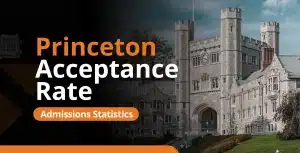
Princeton Acceptance Rate: Admissions Statistics
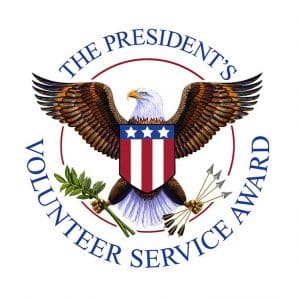
How to Receive the President’s Volunteer Service Award (PVSA)

How to Get a Coca-Cola Scholarship

10 Online Learning Resources for High School Students

What is Harvard Known for?

How to Compete in the FIRST Robotics Competition

How To Compete In The American Protégé International Competitions
Leave a comment cancel reply.
Your email address will not be published. Required fields are marked *
Save my name, email, and website in this browser for the next time I comment.
Recent Articles

What Should You Write in...

How to Secure an Internal...

How to Join the FBLA...

How to Apply for the...

Top 33 Colleges That Require...

How to Apply for RISE...

Balancing Cost and Comfort: Finding...

How to Compete In the...

How to Get the Cameron...

How to Receive the President’s...
Sign up now to receive insights on how to navigate the college admissions process..

Admissions Counseling
- Academic & Extracurricular Profile Evaluation
Copyright © AdmissionSight 2024
Privacy Policy - Terms and Conditions
Calculate for all schools
Your chance of acceptance, your chancing factors, extracurriculars, johns hopkins sample essays.
Hey everyone! I'm working on my app for Johns Hopkins, and I was wondering if anyone could share their successful essays or where I could find some samples? It'd be great to see what worked for others!
Hello! It's exciting to hear that you're working on your application for Johns Hopkins. You can indeed find some examples of strong essays on CollegeVine's blog: https://blog.collegevine.com/johns-hopkins-essay-example. I can also give you some tips and strategies for writing your own standout essay.
First, while it's helpful to read sample essays in general for inspiration, remember that each applicant is unique, and what worked for someone else might not work for you. Your own voice and story are the keys to presenting a strong application to Johns Hopkins.
In order to craft a personal, distinctive essay, familiarize yourself with Johns Hopkins' supplemental essay prompt. Understand what the university is looking for in the responses and make sure your essay fully answers the question. Spend some time brainstorming and reflecting on your personal experiences to identify topics that would showcase your personality, intellectual curiosity, personal growth, or how you can contribute to the Hopkins community.
As you're writing, keep your essay focused on a unique and personal experience. Admissions officers appreciate authenticity and genuine introspection, so don't be afraid to discuss your own thought process, feelings, and actions instead of trying to emulate someone else's essay. Make sure your essay is engaging and well-written by using vivid language and painting a clear picture for the reader.
One other point to consider is to avoid overused topics, such as recounting a sports victory, discussing a mission trip, or talking about moving to a new school or country. Instead, search your memories and experiences for fresh and compelling topics that reveal something about you that the admissions officers wouldn't find elsewhere in your application. You can read up on some cliché topics to avoid, and how to take a more effective approach, on CollegeVine's blog: https://blog.collegevine.com/cliche-college-essay-topics.
To improve your essay, seek feedback from others, such as friends, family members, or teachers. They can provide valuable insights and constructive criticism, which will help you polish your essay and make sure it's the best representation of you.
Finally, don't hesitate to take advantage of CollegeVine's essay help resources, including their breakdown of the current Johns Hopkins supplemental essay prompts ( https://blog.collegevine.com/how-to-write-the-johns-hopkins-university-essays) , their Free Peer Essay Review Tool, and their paid reviews by expert college admissions advisors.
Good luck with your application, and I hope these tips help you craft an essay that showcases who you are and what you can bring to the Hopkins community!
About CollegeVine’s Expert FAQ
CollegeVine’s Q&A seeks to offer informed perspectives on commonly asked admissions questions. Every answer is refined and validated by our team of admissions experts to ensure it resonates with trusted knowledge in the field.
Get the Reddit app
Join the A2C Discord!
r/ApplyingToCollege is the premier forum for college admissions questions, advice, and discussions, from college essays and scholarships to college list help and application advice, career guidance, and more.
Are the "Essays That Worked" released by Johns Hopkins the best of the best, or are they the norm for accepted students?
If it's the latter, then I'm fuuuuuuuuuuuuuucked
you belong here
- Search All Categories
- Advanced Practice Providers Jobs
- Allied Health/Clinical Professional Jobs
- Clerical and Administrative Support Jobs
- Coding Jobs
- Finance Jobs
- Information Technology Jobs
- Laboratory/Pathology Jobs
- Leadership Jobs
- Manager/Supervisor Jobs
- Non-Clinical Professional Jobs
- Nurse Practitioner Jobs
- Nursing Jobs
- Nursing Management/Leadership Jobs
- Nursing Support/Patient Care Jobs
- Pharmacy Jobs
- Physician Assistant Jobs
- Physicians Jobs
- Radiology Jobs
- Respiratory Jobs
- Sightline Jobs
- Social Work/Mental Health Jobs
- Support Services (Services/Trades) Jobs
- Search All Affiliates
- School of Medicine
- Search All Locations
- District Of Columbia Jobs
- Florida Jobs
- Georgia Jobs
- Maryland Jobs
- Virginia Jobs
- Search All Schedules
- 10 Miles 25 Miles 50 Miles 100 Miles Submit Zip Code and Radius Search
- View Remote Jobs
- For Military Professionals and Veterans Military Code
- View All Jobs
CDM Coordinator
- Refer a Friend
Work from Home

- Share on Facebook
- Share on Twitter
- Share on LinkedIn
- Share via Email
Job Details
You Belong Here ! Come see why the Johns Hopkins Hospital is a world-renowned leader in patient care, serving the greater Baltimore community and patients from all across the globe. Our friendly and knowledgeable staff teams provide support throughout our many specialty departments and centers, from primary visits to emergency care.
What Awaits You?
• Career growth and development
• Diverse and collaborative working environment
• Affordable and comprehensive benefits package including Tuition Reimbursement
Take a tour of our campus : https://www.youtube.com/watch?v=KnNaPzR-AEE
The Chargemaster Coordinator is responsible for the maintenance of the Johns Hopkins Hospital Charge Description Master (CDM). This includes: 1) working with administrative / clinical management of departments to review the CDM and charge tickets; 2) conducting training sessions for clinical personnel on proper charge entry; 3) communicating to clinical administration changes in coding and billing requirements; 4) assisting clinical administration in implementation of CDM changes; 5) assisting patient financial services in CDM related and claim problem resolutions; 6) coordinating all necessary activities to ensure up to date CDM and charge tickets and communicating regulatory changes pertinent to each specific department across JHH outpatient departments.
Full time (40 hours per week)
Location : Remote
Our organization is registered for remote work in the following states: MD, VA, DC, FL, PA, and DE. To be considered for a remote position, relocation is required to one of the registered states if not currently residing in one.
Requirements :
Requires High School Diploma or equivalent.
Required Licensure, Certification, Etc.: One of the following certifications is required: CPC-H CPC, CCS, RHIA, RHIT or other coding certification.
Minimum of 4 years of coding, compliance and/or clinical documentation experience in an acute hospital environment.
Our competitive Benefit Package is designed to support the well-being and financial security of our employees and includes:
- Full medical, dental, and vision plans,
- Retirement plans,
- Paid time off (PTO),
- Tuition reimbursement for you and your dependents,
- Earn up to $1,000 annually for practicing self-care with Healthy @ Hopkins
- Tell a friend and get paid! Ask about our Employee Referral Program Bonus!
- And more! Visit https://jhh.mybenefitsjhhs.com/
The University of Vermont Medical Center Glassdoor Reviews and Ratings

- Biochemistry and Molecular Biology
- Biostatistics
- Environmental Health and Engineering
- Epidemiology
- Health Policy and Management
- Health, Behavior and Society
- International Health
- Mental Health
- Molecular Microbiology and Immunology
- Population, Family and Reproductive Health
- Program Finder
- Admissions Services
- Course Directory
- Academic Calendar
- Hybrid Campus
- Lecture Series
- Convocation
- Strategy and Development
- Implementation and Impact
- Integrity and Oversight
- In the School
- In the Field
- In Baltimore
- Resources for Practitioners
- Articles & News Releases
- In The News
- Statements & Announcements
- At a Glance
- Student Life
- Strategic Priorities
- Inclusion, Diversity, Anti-Racism, and Equity (IDARE)
- What is Public Health?
A Healthier, Climate-Smart Way Forward for Transportation
Researchers say physical and mental health, as well as access to jobs, healthy food, and health care must be considered when making transportation decisions
Johns Hopkins researchers, lawmakers, and government officials met on June 17 at the Johns Hopkins Bloomberg School of Public Health to discuss evidence-based approaches to make both climate health and human health a pivotal part of national transportation infrastructure decisions.
“Transportation is the number one producer of greenhouse gas emissions in the U.S.,” said Shima Hamidi , director of the Johns Hopkins Center for Climate-Smart Transportation. “It’s just going to get worse unless we can come up with actionable research—research that is ready to be implemented, ready to be translated into changes in policy and practice.”
Researchers also stressed that physical and mental health, as well as access to jobs, healthy food, and health care must be considered when making transportation decisions: “Clearly human health and transportation intersect,” said Ed Schlesinger, dean of the Whiting School of Engineering and moderator of the roundtable discussion.
Topics of discussion also included:
- Narrowing road lanes to allow for more walking and biking, while reducing asphalt and the risk of collisions.
- Fostering the adoption of electric vehicles, with equitable access to charging stations, and sustainable expansion of the power grid.
- Using automated vehicles to bring fresh food to people throughout urban areas.
- Investment in public transportation to improve access to jobs, health care, school, and other opportunities.
- Reducing air pollution from transportation—particularly in vulnerable neighborhoods.
- Conducting health impact assessments to understand the relationships between transportation and health.
Robert Hampshire, deputy assistant secretary for research and technology and chief science officer at the U.S. Department of Transportation, noted that the $1.2 trillion bipartisan infrastructure law has spurred “one of the biggest buildouts of physical infrastructure to improve communities.”
“We really are, on the research and technology side, making sure that we’re using the best evidence that we have to do that, particularly on the resilience and climate side,” Hampshire said.
He and Gretchen Goldman, climate change research and technology director in DOT’s Office of Research and Technology, noted that the Biden-Harris administration is eager for input from researchers on the best projects that will advance transportation, climate, and health goals forward in ways that are mindful of their many intersections.
Keshia Pollack Porter , chair of the Department of Health Policy and Management , said it’s important to ask questions when considering projects to ensure a health equity lens is applied.
“Whether we’re thinking about where to put charging stations for EVs or even strategies related to the Key Bridge [collapse], how do we think in advance about how those strategies ... advance health equity and not harm health?”
The discussion highlighted the importance of collaboration across fields and with affected communities.
“It’s a multi-player, multi-objective problem, and so the only way you [solve that] in a way that is equitable and robust is if you have everyone together,” said Ben Zaitchik , a professor of Earth & Planetary Sciences at Johns Hopkins University.
The Center for Climate-Smart Transportation launched in 2023 with a $10 million grant from the U.S. Department of Transportation as a consortium of six institutions including Johns Hopkins University , Massachusetts Institute of Technology, University of Texas at Austin , University of Utah , Morgan State University (MSU) , and Diné College .
Watch the roundtable on C-SPAN
Related Content
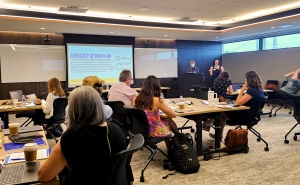
First-ever Advocacy Action Lab provides Johns Hopkins faculty and staff with practical advocacy skills for public health policy change

From the Classroom to the Capitol: Gretchen Jacobson, PhD’s Journey in Public Health Policy

Michelle Ogunwole Receives Grant from the National Institute of Diabetes and Digestive and Kidney Diseases

Deidra Crews Receives 2024 Louis W. Sullivan, MD, Award

Nakiya Showell Reflects on Infant Patient Death in Essay
Masks Strongly Recommended but Not Required in Maryland, Starting Immediately
Due to the downward trend in respiratory viruses in Maryland, masking is no longer required but remains strongly recommended in Johns Hopkins Medicine clinical locations in Maryland. Read more .
- Vaccines
- Masking Guidelines
- Visitor Guidelines

FODMAP Diet: What You Need to Know
Reviewed By:

Hazel Galon Veloso, M.D.
You may have heard of the FODMAP diet from a friend or on the internet. When people say “FODMAP diet,” they usually mean a diet low in FODMAP — certain sugars that may cause intestinal distress. This diet is designed to help people with irritable bowel syndrome (IBS) and/or small intestinal bacterial overgrowth (SIBO) figure out which foods are problematic and which foods reduce symptoms.
“The low FODMAP diet is a temporary eating plan that’s very restrictive,” says Johns Hopkins gastroenterologist Hazel Galon Veloso, M.D. “It’s always good to talk to your doctor before starting a new diet, but especially with the low FODMAP diet since it eliminates so many foods — it’s not a diet anyone should follow for long. It’s a short discovery process to determine what foods are troublesome for you.”
What is FODMAP?
FODMAP stands for fermentable oligosaccharides, disaccharides, monosaccharides and polyols, which are short-chain carbohydrates (sugars) that the small intestine absorbs poorly. Some people experience digestive distress after eating them. Symptoms include:
- Constipation
- Stomach bloating
- Gas and flatulence
How does the low FODMAP diet work?
Low FODMAP is a three-step elimination diet:
- First, you stop eating certain foods (high FODMAP foods).
- Next, you slowly reintroduce them to see which ones are troublesome.
- Once you identify the foods that cause symptoms, you can avoid or limit them while enjoying everything else worry-free.
“We recommend following the elimination portion of the diet for only two to six weeks,” says Veloso. “This reduces your symptoms and if you have SIBO, it can help decrease abnormally high levels of intestinal bacteria. Then every three days, you can add a high FODMAP food back into your diet, one at a time, to see if it causes any symptoms. If a particular high FODMAP food causes symptoms, then avoid this long term.”
What can I eat on the FODMAP diet?
Foods that trigger symptoms vary from person to person.
To ease IBS and SIBO symptoms, it’s essential to avoid high FODMAP foods that aggravate the gut, including:
- Dairy-based milk, yogurt and ice cream
- Wheat-based products such as cereal, bread and crackers
- Beans and lentils
- Some vegetables, such as artichokes, asparagus, onions and garlic
- Some fruits, such as apples, cherries, pears and peaches
Instead, base your meals around low FODMAP foods such as:
- Eggs and meat
- Certain cheeses such as brie, Camembert, cheddar and feta
- Almond milk
- Grains like rice, quinoa and oats
- Vegetables like eggplant, potatoes, tomatoes, cucumbers and zucchini
- Fruits such as grapes, oranges, strawberries, blueberries and pineapple
Get a full list of FODMAP food from your doctor or nutritionist.
Who should try it?
The low FODMAP diet is part of the therapy for those with IBS and SIBO. Research has found that it reduces symptoms in up to 86% of people.
Because the diet can be challenging during the first, most restrictive phase, it’s important to work with a doctor or dietitian, who can ensure you’re following the diet correctly — which is crucial to success — and maintaining proper nutrition.
“Anyone who is underweight shouldn’t try this on their own,” says Veloso. “The low FODMAP diet isn’t meant for weight loss, but you can lose weight on it because it eliminates so many foods. For someone at an already too low weight, losing more can be dangerous.”
How a Doctor Can Help
Dietary changes can have a big impact on IBS and SIBO symptoms, but doctors often use other therapies as well. Antibiotics can quickly reduce small intestinal bacterial overgrowth, while laxatives and low-dose antidepressants can relieve symptoms of irritable bowel syndrome.
A combination of dietary changes, medications and stress management techniques is often the best approach. Learn how you can work with a doctor to find the SIBO and IBS treatments that work well for you.
Find a Doctor
Specializing In:
- Neurogastroenterology
- Irritable Bowel Syndrome
- Motility Disorders
Find a Treatment Center
- Gastroenterology and Hepatology
- Neurogastroenterology Center
- Pediatric Intestinal Rehabilitation Program (Johns Hopkins All Children's Hospital)
Find Additional Treatment Centers at:
- Howard County Medical Center
- Sibley Memorial Hospital
- Suburban Hospital

Request an Appointment

Ginger Benefits

Turmeric Benefits

5 Foods to Avoid if You Have IBS
Related Topics
- Food and Nutrition
- Irritable Bowel Syndrome (IBS)
- Eating for Your Gut
- High-Fiber Recipes
- About the Hub
- Announcements
- Faculty Experts Guide
- Subscribe to the newsletter
Explore by Topic
- Arts+Culture
- Politics+Society
- Science+Technology
- Student Life
- University News
- Voices+Opinion
- About Hub at Work
- Gazette Archive
- Benefits+Perks
- Health+Well-Being
- Current Issue
- About the Magazine
- Past Issues
- Support Johns Hopkins Magazine
- Subscribe to the Magazine
You are using an outdated browser. Please upgrade your browser to improve your experience.

Credit: Will Kirk / Johns Hopkins University
Johns Hopkins launches major effort to elevate the arts
Across the university, art and arts programming abound. a new initiative led by dan weiss, former president of the metropolitan museum of art in new york, aspires to boost the arts through a synergistic vision, enriching the institution and the broader community.
By Emily Gaines-Buchler
Johns Hopkins University boasts a well-deserved reputation as a place to pursue medicine, engineering, and the health sciences. Yet the arts are also a central part of university life, from striking campus sculptures to stirring student performances to soaring Peabody symphonies. Under the guidance of Provost Ray Jayawardhana , the university is launching an initiative to elevate and enhance arts offerings across the university, and to increase awareness of the art already in our midst.
Nearly 1,000 public performances take place on Peabody's campus annually, and Johns Hopkins is home to three museums and more than 200 works of art on view in public spaces. Among them, Robert Israel's super-sized family of puffer fish float playfully in the entryway of the Johns Hopkins Children's Center; Kendall Buster's white vessel-like forms, Vessel Field , hover above in Gilman Hall's atrium; and Shahzia Sikander's mosaic Metaxu enlivens a café wall in the Hopkins Bloomberg Center in Washington, D.C. The list goes on.
This new initiative will aim to bolster the arts across the university, embracing their potential to invigorate community, enrich student learning, and inspire the exchange of ideas across disciplines and divisions.
"The arts inspire creativity, spark dialogue, and explore the variety of human experience and emotion," Jayawardhana said. "We are excited to embark on a focused effort to ensure the arts are elevated as an integral part of the Hopkins identity and tightly woven into the fabric of our community. Through this initiative, we will strengthen our artistic offerings, foster new cross-disciplinary collaborations, and deepen our connections with Baltimore and the wider world around us. As we prepare to celebrate 150 years of academic excellence at this university, it is fitting that we embrace the arts as a vital force that can unite, uplift, and propel us forward."
Image credit : Johns Hopkins University
Making the arts integral
The effort will be led by Daniel H. Weiss , Homewood Professor of the Humanities at Johns Hopkins and president emeritus of the Metropolitan Museum of Art in New York, where he served as president and chief executive officer from 2015 to 2023. Weiss' ties to Johns Hopkins date to his days as a doctoral student pursuing a PhD in Western medieval and Byzantine art, which he earned in 1992. Afterward, he stayed on as an art history professor, eventually becoming chair of his department and dean of the Krieger School of Arts and Sciences, before leaving to serve as president of Lafayette College and, later, Haverford College.
"I returned to Hopkins last summer eager to be part of a place that means so much to me and where I spent so much of my professional life," Weiss says. "I have so much enthusiasm to be part of this community."
Upon returning, Weiss says, he saw an opportunity to increase the collective consciousness of the arts at Johns Hopkins—to make the arts integral to the Hopkins experience.
"All great universities take very seriously their commitment to the arts and humanities," Weiss says. "Johns Hopkins has always had that commitment, but it hasn't always been highly visible, synergistic, or strategic."
The arts initiative aspires to change that, starting with the creation of a task force made up of faculty, staff, administrators, students, and trustees working in partnership with supporters and friends. The task force will convene this summer to assess current arts programming and identify areas of opportunity to invest in facilities, strengthen cultural programs, and formulate ambitious initiatives before presenting a report and recommendations in the spring of 2025. Then, as JHU celebrates its 150th anniversary in 2026, the team will start to implement its plan.
As part of the endeavor, Weiss has taken on a new role as senior adviser to the provost for the arts. He will work with Julie Messersmith , chief of staff and associate vice provost for strategic initiatives, and Kristin Blanchfield, senior associate vice president for philanthropic partnerships, to spearhead the initiative.
More than visual art
While assessing and adding to the university's visual arts offerings are part of the initiative, the task force will also examine and add to arts-related programming, projects, and research.
Already, a plethora of research and programming exists across the university. Best known are the Peabody Institute's world-class music and dance performances, extensive concert calendar, professional training for its Conservatory students, and performing arts instruction for community members through its Preparatory. Peabody's dual degree program and growing footprint in arts and health—including the recent appointment of a Bloomberg Distinguished Professor in Performing Arts and Health—integrate the performing arts across multidisciplinary areas of study.
"While Peabody—a professional school that recruits and trains the next generation of musicians and dancers—is an integral part of Johns Hopkins, I am so happy to see the launch of an initiative to engage our entire university community in the arts," Peabody Institute Dean Fred Bronstein said. "The history of civilization is in many ways seen through the lens of its arts and artists. As a world-renowned university, Johns Hopkins can shape that lens by reflecting the essential nature and magic of an arts experience back to its community, and to the world."
Lesser-known opportunities are plentiful, including courses like Art and Social Justice in the Krieger School, which connects students with the Sheridan Libraries' vast archival collections, and the Whiting School's HEMI/MICA Extreme Arts Program , which brings together artists and engineers to experiment and innovate. Among many others:
The Brain Science Institute's International Arts + Mind Lab explores how the arts, architecture, and design nurture our minds and foster well-being;
The Center for Music and Medicine investigates the role of music in health, using rhythmic activities and musical performances to help treat patients with neurological illnesses;
And Cosmic Visions, a research project of Classics Department chair Karen ní Mheallaigh , involves partnerships with Baltimore City Public Schools and the James Webb Space Telescope, building bridges between the humanities and STEM with the ultimate aim of inspiring science-literate humanities scholars and STEM scholars skilled in humanistic inquiry.
"The arts enrich our humanity. Through them, we can often speak across political differences, uncover hidden sides of ourselves, and partake of an enterprise that has characterized human life since its inception," Krieger School Dean Chris Celenza said. "The Krieger School's rich arts programs, from theater to visual arts to film and media studies, contribute to this mission already, and we could not be more excited and eager to be part of this larger initiative, led by Dan Weiss."
Celenza added that, as director of the American Academy in Rome from 2010 to 2014, he "saw firsthand how the arts make a community come to life."
Even as the task force and initiative kick off, the university continues to introduce new and exciting arts ventures. For one, nine works of art by Baltimore-based artists—all on the cusp of international acclaim—were recently acquired by the university and will soon be installed on JHU campuses or in Hopkins spaces. And at the Hopkins Bloomberg Center, the state-of-the-art theater houses weekly Peabody performances in a building that is a work of art itself .
"Across the institution we preserve and share vast troves of cultural and scientific materials, all of them brimming with artistic possibilities. For these disparate collections to be brought together as part of a cohesive strategy and integrated with academic and student experiences is a critical step to maximizing that potential," said Elisabeth Long , Sheridan Dean of University Libraries, Archives, and Museums. "We look forward to partnering with the task force, and I join my colleagues across the institution in eagerly anticipating the day when Hopkins' rightful reputation as an artistic center will rival its scientific preeminence."
Task Force on the Arts
Tunde Ayodeji , Mechanical Engineering Major '26, Whiting School of Engineering; Music Minor '26, Krieger School of Arts and Sciences
Cybele Bjorklund , Vice President for Federal Strategy; Executive Director of the Hopkins Bloomberg Center
Margaret Burri , Associate Director for Academic Liaison and Special Collections, Sheridan Libraries and University Museums
Anna Celenza , Professor of Musicology, Peabody Institute; Professor in The Writing Seminars, Krieger School of Arts and Sciences
Lisa Cooper , Bloomberg Distinguished Professor, School of Medicine, Bloomberg School of Public Health, and School of Nursing
Carl DuPont , Associate Professor of Voice, Peabody Institute
John Gardner , Master of Business Administration '25, Carey Business School
Sarah Hoover , Associate Dean for Innovation in the Arts and Health, Peabody Institute and Johns Hopkins Medicine
Jennifer Kingsley , Associate Teaching Professor and Director of Museums and Society, Krieger School of Arts and Sciences
Susan Magsamen , Executive Director of the International Arts and Mind Lab, Pedersen Brain Institute
Dean Moyar , Vice Dean for Humanities and Professor of Philosophy, Krieger School of Arts and Sciences
Jackie O'Regan , Curator of Cultural Properties, Sheridan Libraries and University Museums
Carmine Petrone , Krieger Alumnus '04; Trustee, JHU; Chair, Sheridan Libraries Advisory Board
Corrine Sandone , Director of the Department of Art as Applied to Medicine, School of Medicine
Nicoleen Willson , Director of the Office of Arts and Innovation, Student Affairs
Posted in Arts+Culture , University News
Tagged fine arts , peabody conservatory
Related Content

Art historian Daniel Weiss returns
You might also like, news network.
- Johns Hopkins Magazine
- Get Email Updates
- Submit an Announcement
- Submit an Event
- Privacy Statement
- Accessibility
Discover JHU
- About the University
- Schools & Divisions
- Academic Programs
- Plan a Visit
- my.JohnsHopkins.edu
- © 2024 Johns Hopkins University . All rights reserved.
- University Communications
- 3910 Keswick Rd., Suite N2600, Baltimore, MD
- X Facebook LinkedIn YouTube Instagram
Facing Finals: 5 Tips on Crossing That Final Stretch

When I first started college, I wasn’t sure how finals would differ from my high-school tests and how I would prepare for them. There is such a wide variety of testing formats in college, from your conventional multiple choice and free response to timed in-class essays and 10-page papers. Facing college finals for the first time? Here are some tips I’ve picked up along the way.
1. Explore different study locations
If you are getting distracted or losing focus when studying, try changing your scenery. I found the ideal study space varies dramatically from person to person. If you enjoy some background noise and conversation, I suggest the Brody Learning Commons atrium. For a beautiful interior and silence, try Gilman Hall.
2. Divide your work creatively
In college, I realized I could easily fall into the trap of picking the finals I prefer to study for and procrastinating on others. This is why I think it’s important to divide your work, so you don’t spend too much time on one course. For example, have a paper you’re dreading writing? Commit to at least one page per day, and soon enough you’ll have a finished product. Another strategy I picked up from a friend is to “spin the wheel.” If you have trouble deciding what to do next, place your tasks onto a computer-generated wheel and let fate make that choice. This way, you won’t fall into the habit of putting off the tasks you want to avoid.
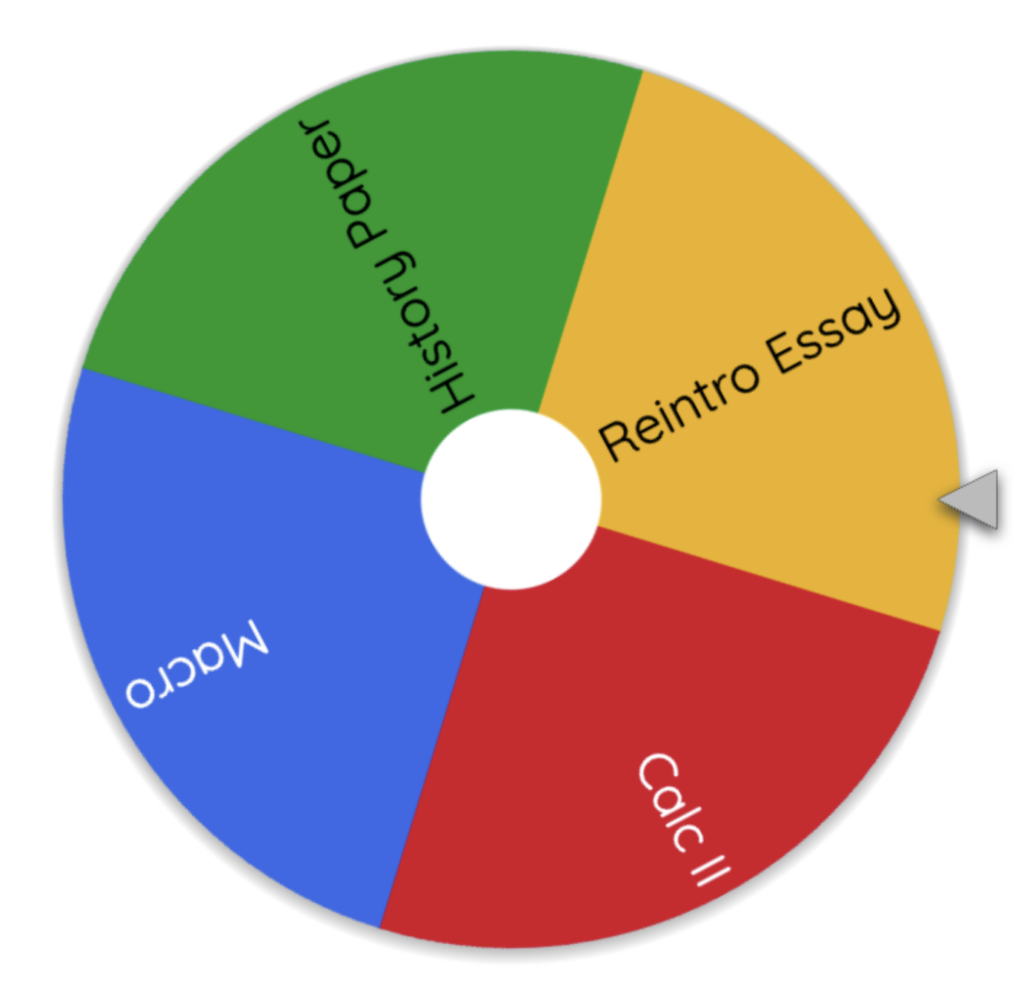
3. Find your rhythm
Leading up to finals, the “flow state” is the coveted treasure all college students are desperately reaching for. In universities with reading weeks (days dedicated to studying for finals), it can be harder to maintain focus throughout the week. I suggest figuring out what kind of study interval works best for you. Early in the semester, I realized giving myself multiple breaks between work only distracted me and caused me to procrastinate more. I found I studied best when sectioning out my day into a large chunk of reviewing followed by completely relaxing.
4. Reach out to your instructors and classmates
If your professor or TA has office hours, go to them. Even just listening to the questions of others can help you discover missing parts in your understanding. Forming study groups is another great way to boost your learning. Studying with others is rewarding because you pool all your knowledge together. I would also suggest taking turns explaining a concept or problem to encourage participation. During one of my study groups, we would take turns summarizing each reading.
5. Communicate with friends and roommates
During reading week and finals week, your friends will be crucial support systems, so don’t be afraid to reach out. My friends planned hangouts ahead of time to ensure we would all have a moment to relax. Another change from high school exams is the presence of your roommate. As someone who needs their sleep before a big test, I think it would make a great difference to reach out to your roommate in advance to let them know about your finals schedule. This is a great opportunity to collaborate with your roommate on an ideal sleep schedule.
These are also tips you can apply to your finals even as a high school student. While these work for me, it’s important to figure out what suits you best!
Posts you may also be interested in
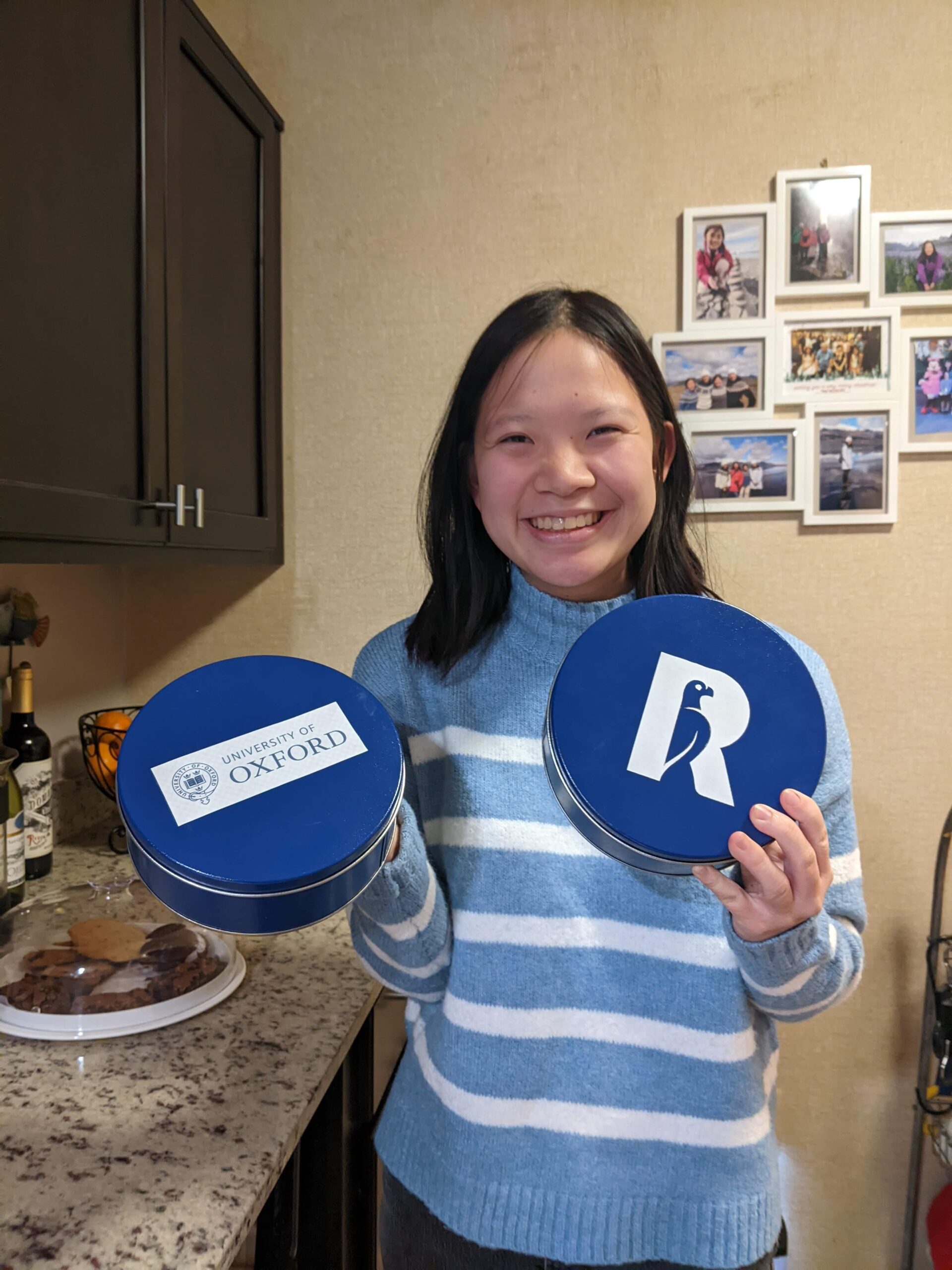
The Road to the Rhodes

- Student Life
Epidemic Proportions Launch Party: Public Health and So Much More

- Campus Resources
Getting Your Foot Through the Door for Office Hours
Quick links:.
- Majors, Minors & Programs
- Application Deadlines & Requirements
- College Planning Guide
Advertisement
Supported by
Small Step Could Bring Big Relief to Young Undocumented Immigrants
A new Biden administration measure enables “Dreamers” to get work visas that could free them from relying on the DACA program, whose survival is in doubt.
- Share full article

By Miriam Jordan
President Biden on Tuesday announced an initiative that could be life-changing for hundreds of thousands of undocumented young adults, known as Dreamers, whose ability to live and work in the United States has long been tied to a temporary immigration program that has been on life support.
The new directive will enable many beneficiaries of an Obama-era program known as DACA, or Deferred Action for Childhood Arrivals, to swiftly receive employer-sponsored work visas for the first time. Eventually, the young immigrants could apply through their employers for green cards, or permanent lawful residency.
The new policy is one of two new immigration measures the administration announced on Tuesday. It means that a generation of young people who entered the country illegally as children will no longer be dependent on whether the DACA program, implemented as a temporary fix in 2012 and ensnared ever since in complex litigation, survives or dies.
For many, the program has allowed them to remain in the only country they really know. Sebastian Melendez, a 25-year-old registered nurse at the Johns Hopkins Hospital in Baltimore, said his DACA status had enabled him to work alongside surgeons doing innovative gastrointestinal procedures, buy a car, rent an apartment and help his parents financially.
But as the program was alternately halted and renewed by the courts, he has faced a constant threat of possible deportation.
We are having trouble retrieving the article content.
Please enable JavaScript in your browser settings.
Thank you for your patience while we verify access. If you are in Reader mode please exit and log into your Times account, or subscribe for all of The Times.
Thank you for your patience while we verify access.
Already a subscriber? Log in .
Want all of The Times? Subscribe .

IMAGES
COMMENTS
The essays are a place to show us who you are and who you'll be in our community. It's a chance to add depth to something that is important to you and tell the admissions committee more about your background or goals. Below you'll find selected examples of essays that "worked," as nominated by our admissions committee.
Here you can read their essay examples and see how they got accepted. I've also included some Common App essays written by admitted JHU students. Johns Hopkins Prompt: Collaboration. 1. Runners Take Your Marks. 2. Percussive Marching Arts. Johns Hopkins Prompt: Discuss an Accomplishment. 3.
As a transfer applicant, your essay is a chance to tell the admissions committee more about your background or goals and how you would pursue them at Hopkins. Below you'll find selected examples of transfer applicant essays that "worked," as nominated by our admissions committee. These selections represent just a few essays we found ...
Essays That Worked is a community of students and parents to share their successful college application essays, ... Johns Hopkins, Northwestern, and more. Private College. 4 Carnegie Mellon Supplemental Essay Examples (2024) Private College. 6 Duke Supplemental Essays That Worked for 2024.
Johns Hopkins Essays that Worked #1. There are two kinds of group work. The first is your proficiency group work where there is a task to be done and a leader simply divides the work among the group and it gets done in a fraction of the time it would take an individual. The second is work without a defined end goal.
Hopkins Insider - Essays That Worked 2023. ... Johns Hopkins University 3400 N. Charles St., Mason Hall Baltimore, MD 21218-2683. GPS address - do not use for mail. 3101 Wyman Park Drive Baltimore, MD 21218. Contact Us. Sign up for our mailing list. Our Story; Alumni Volunteers;
Johns Hopkins' 2023-2024 cost of attendance (i.e., tuition, room, board, and fees) is $86,065. The university vows to meet 100 percent of demonstrated need, and financial aid packages do not include student loans. 54 percent of first-year students receive financial aid. The average grant for first-year students is $59,000.
4 Key Tips for Writing Your Johns Hopkins Essay. Because the Johns Hopkins supplement has just one prompt, you'll want to do your absolute best on it. That means getting started early and giving yourself plenty of time to polish and refine your work. As with all college essays, you should go through multiple drafts and seek feedback from others ...
If you have done your brainstorming well, writing the actual essay should be pretty straightforward: you want to describe the aspect of your identity you're focusing on, and then connect it to the goal you've chosen to highlight. As just noted above, you have room to work with, so there's no need to rush anything.
Calculate your chances for free right now. Write a brief essay (300-400 words) in which you respond to the following question: Successful students at Johns Hopkins make the biggest impact by collaborating with others, including peers, mentors, and professors. Talk about a time, in or outside the classroom, when you worked with others and what ...
Essay Example #2. Prompt: Founded in the spirit of exploration and discovery, Johns Hopkins University encourages students to share their perspectives, develop their interests, and pursue new experiences. Use this space to share something you'd like the admissions committee to know about you (your interests, your background, your identity, or ...
Through its one mandatory essay prompt, Johns Hopkins University's supplemental section still affords applicants an opportunity to highlight what makes them uniquely qualified for admission. Below is Johns Hopkins's supplemental prompt for the 2023-24 admissions cycle. Additionally, you'll find our tips on how to write a winning composition.
Read over these Johns Hopkins University essays that worked to get an idea of what impresses admissions. Notice in these Johns Hopkins supplemental essays that each student has a concrete sense of self. For example, in the Johns Hopkins essay "Red Over Black" by Elizabeth, she discusses how playing solitaire with her grandmother allowed her ...
Why Essay #2 Worked. This essay stands out because it seamlessly shares the student's journey with Japanese language and culture in a down-to-earth yet informative way. The use of casual Japanese dialogue at the start adds a personal touch, which instantly grabs the reader's attention. ... The Johns Hopkins essay is an opportunity to show the ...
Getting your college essay right is incredibly important, but you already know that or you wouldn't be here. We have compiled a list of our favorite college essays that earned students admission to Johns Hopkins University. We think it's best to jot down your own ideas before clouding your mind with the ideas of others, so quickly type ...
That will give your reader a sense of where you're coming from and how it relates to the interests you want to pursue at Johns Hopkins. As you write, try to avoid these common mistakes: Mistake #1: Writing about the school's size, location, reputation, weather, or ranking. Mistake #2: Simply using emotional language to demonstrate fit.
According to Johns Hopkins: Essays That Worked. One of the richest resources for writing your Johns Hopkins supplement comes from the university itself. Within their admissions information section, the " Essays That Worked " page has numerous examples of essays written by the Class of 2023 that captured the admissions committee's attention.
How Crimson Can Help You Stand Out In Your Johns Hopkins Supplemental Essay for 2021/22. Crimson's advisors get to know each student. They learn about their interests, passions, and career goals. By taking a personal approach, they can help them craft unique supplemental essays that highlight their personalities and help them stand out from ...
Essays That Worked (Johns Hopkins Edition) Posted in Class of 2021, Essays, Perspectives. Still struggling with your college essays? Here's an excellent post from Johns Hopkins University on essays that worked. It provides seven actual essays submitted by applicants and commentary from the admissions committee on why they worked. Tags: Class of ...
The new prompt for the Johns Hopkins supplemental essays 2023-2024 is critical because it invites students to discuss the intersection of their identity and their educational journey. In today's globalized world, understanding and appreciating the multifaceted nature of identity is crucial. Johns Hopkins acknowledges this by asking applicants ...
Your own voice and story are the keys to presenting a strong application to Johns Hopkins. In order to craft a personal, distinctive essay, familiarize yourself with Johns Hopkins' supplemental essay prompt. Understand what the university is looking for in the responses and make sure your essay fully answers the question.
ESSAYS THAT WORKED. We share essays from previously admitted students—along with feedback from our admissions committee—so you can understand what made them effective and how to start crafting your own. ... Johns Hopkins University 3400 N. Charles St., Mason Hall Baltimore, MD 21218-2683. GPS address - do not use for mail. 3101 Wyman Park ...
Try to make your essays anazing! When the applicant pool is of such high-caliber students, especially for the ivies and T20-30s, you need to make these admissions officers like you. Not because of your grades or high standardized test scores,as everyone will have those, but for your spark.
If you are an individual with a disability or a disabled veteran who is unable to use our online tool to search for or apply to jobs, or you need special assistance or an accommodation during any part of the pre-employment process, please contact the Johns Hopkins Health System HR Solution Center at 443-997-5400.
The Center for Climate-Smart Transportation launched in 2023 with a $10 million grant from the U.S. Department of Transportation as a consortium of six institutions including Johns Hopkins University, Massachusetts Institute of Technology, University of Texas at Austin, University of Utah, Morgan State University (MSU), and Diné College.
"The low FODMAP diet is a temporary eating plan that's very restrictive," says Johns Hopkins gastroenterologist Hazel Galon Veloso, M.D. "It's always good to talk to your doctor before starting a new diet, but especially with the low FODMAP diet since it eliminates so many foods — it's not a diet anyone should follow for long.
Making the arts integral. The effort will be led by Daniel H. Weiss, Homewood Professor of the Humanities at Johns Hopkins and president emeritus of the Metropolitan Museum of Art in New York, where he served as president and chief executive officer from 2015 to 2023.Weiss' ties to Johns Hopkins date to his days as a doctoral student pursuing a PhD in Western medieval and Byzantine art, which ...
When I first started college, I wasn't sure how finals would differ from my high-school tests and how I would prepare for them. There is such a wide variety of testing formats in college, from your conventional multiple choice and free response to timed in-class essays and 10-page papers. Facing college finals for the first time? Here are some tips I've picked up along the way.
Alan Reid, a research associate in the Center for Research and Reform in Education (CRRE) at Johns Hopkins University, said he recently spent time working with K-12 educators who use GPT tools to ...
Sebastian Melendez, a 25-year-old registered nurse at the Johns Hopkins Hospital in Baltimore, said his DACA status had enabled him to work alongside surgeons doing innovative gastrointestinal ...